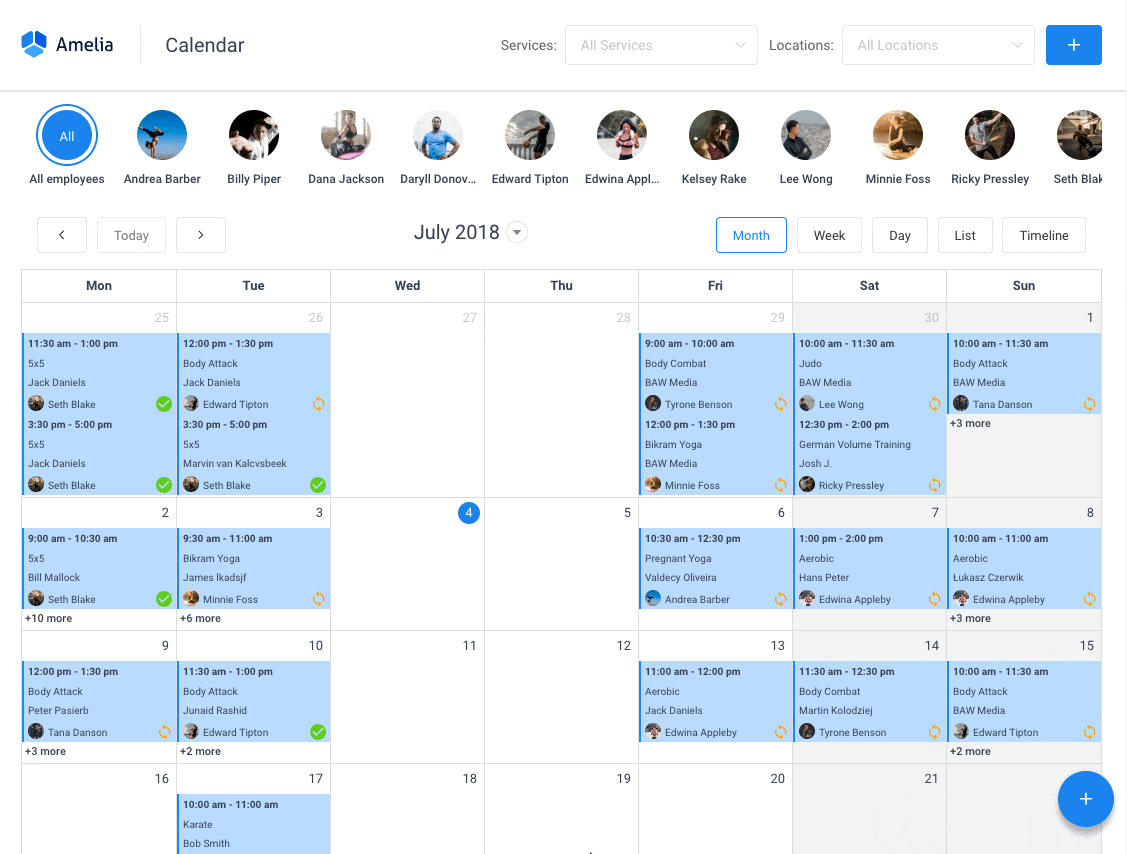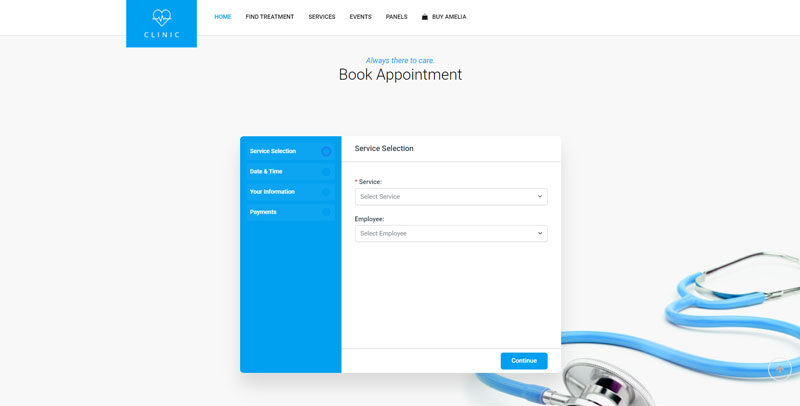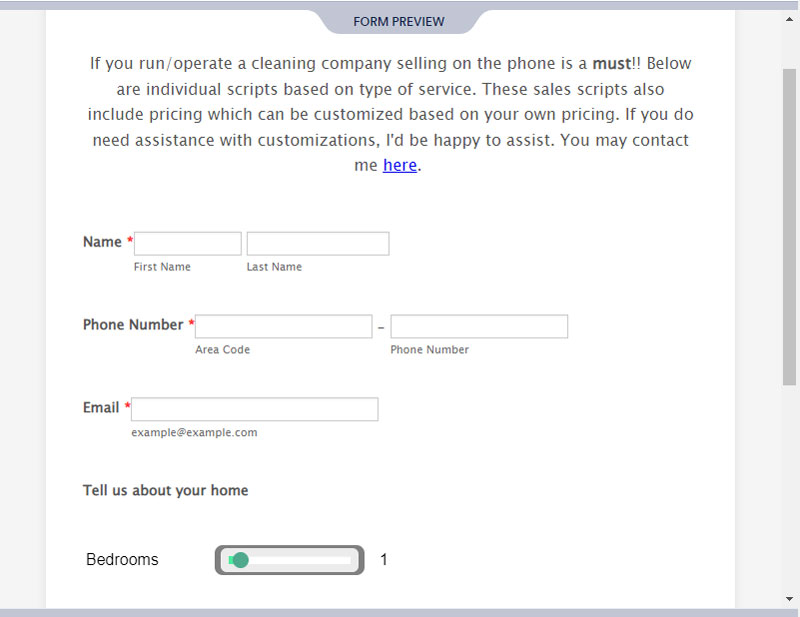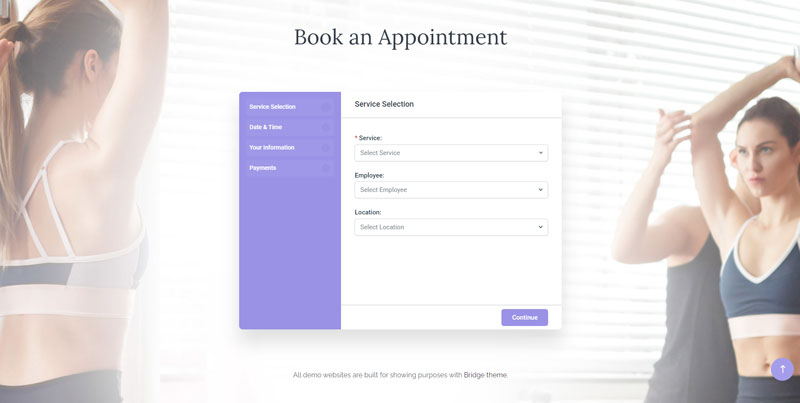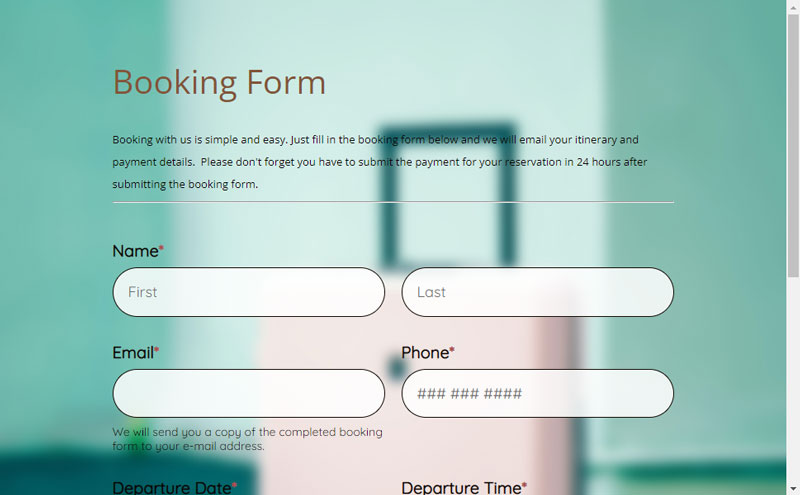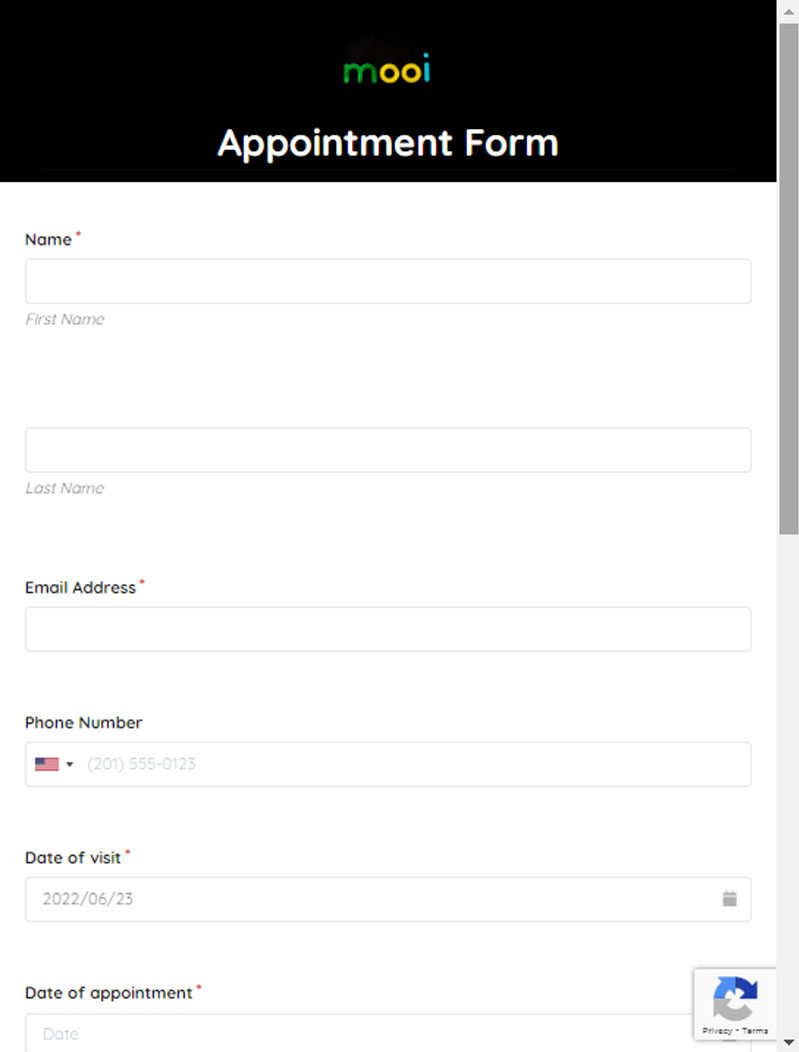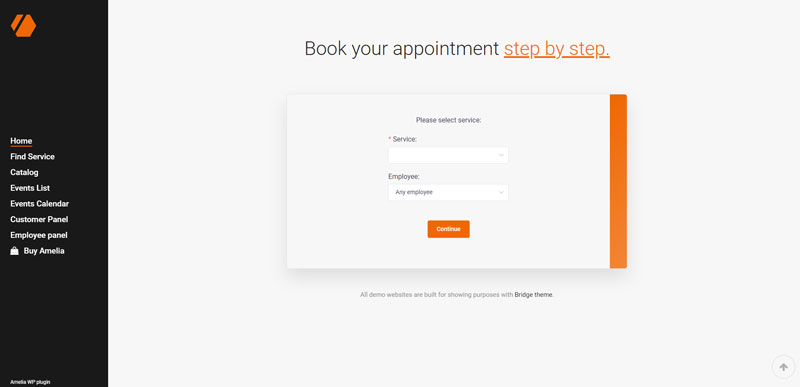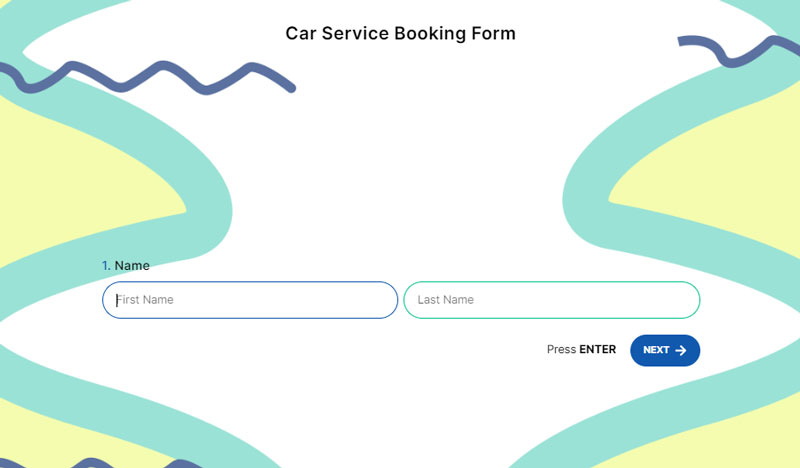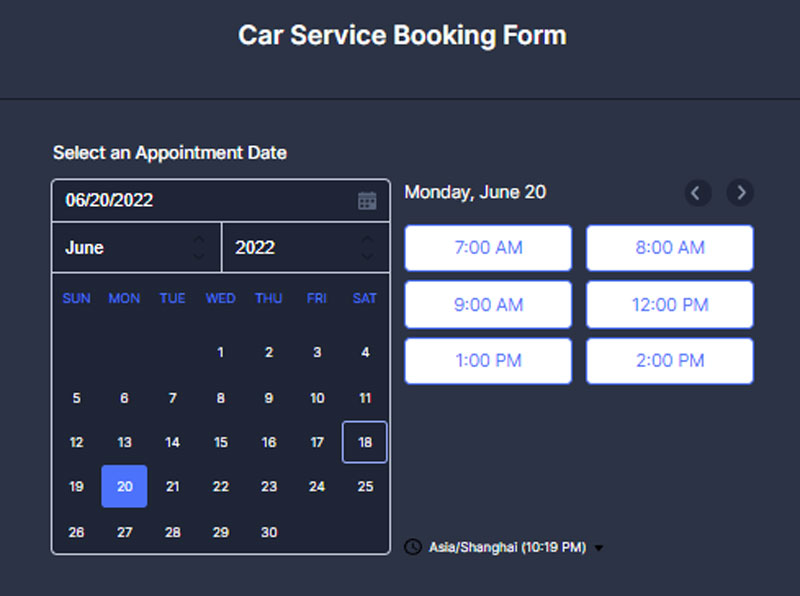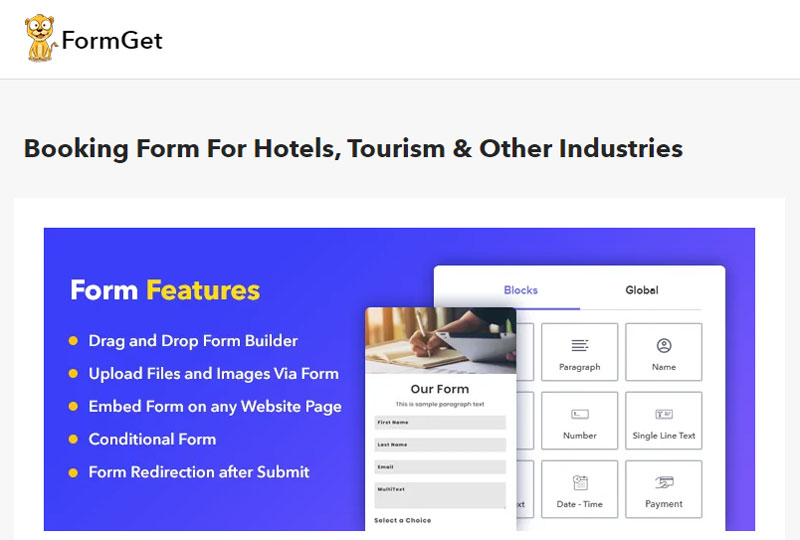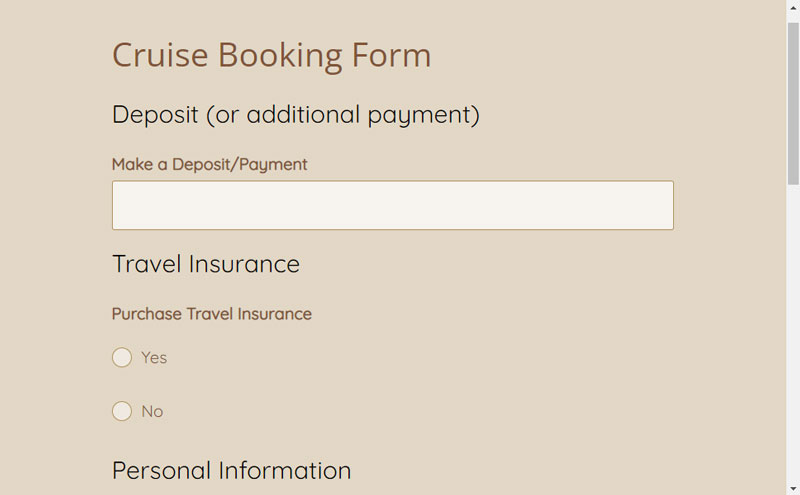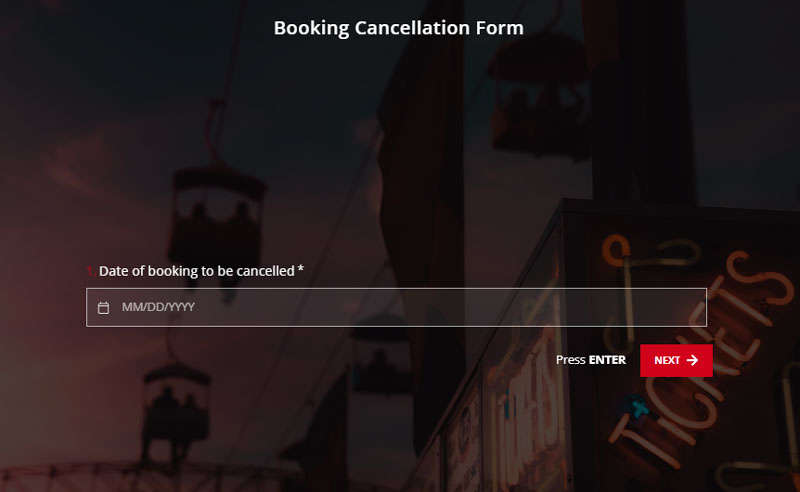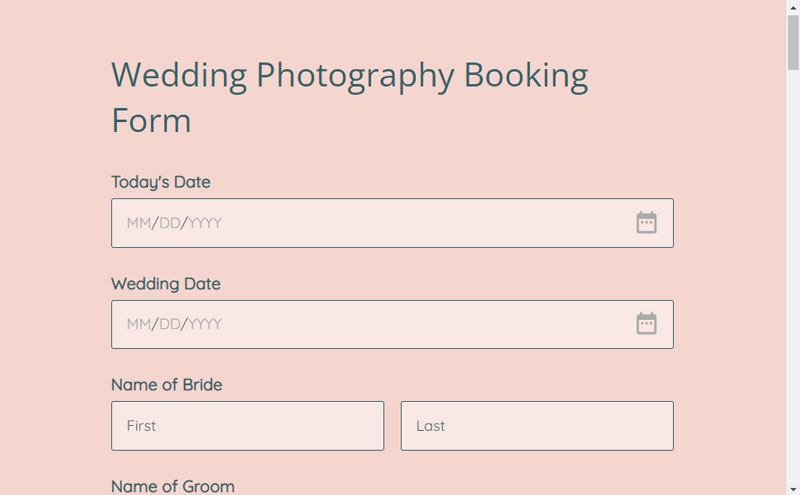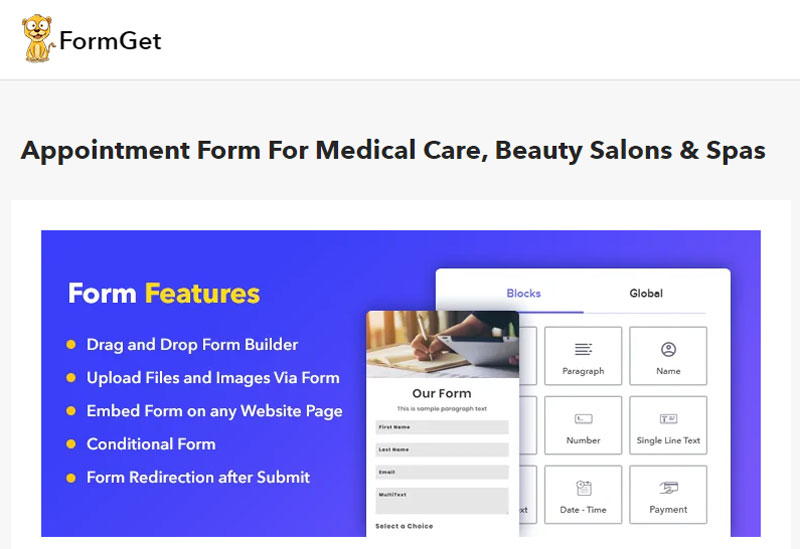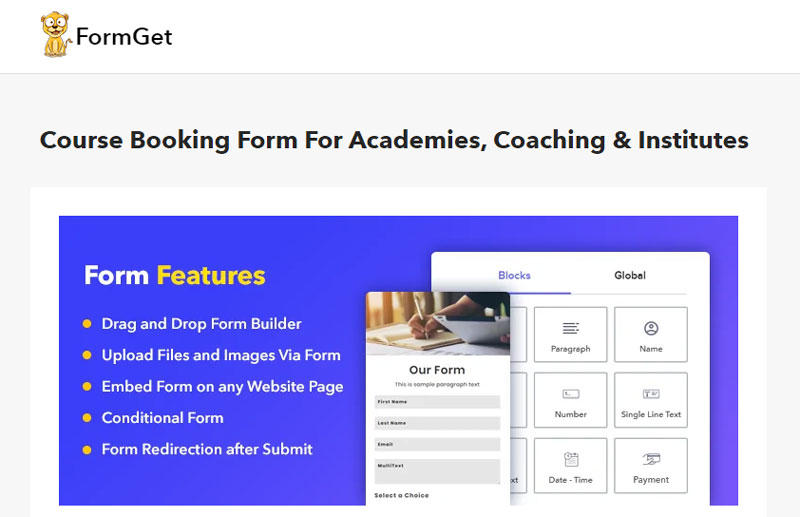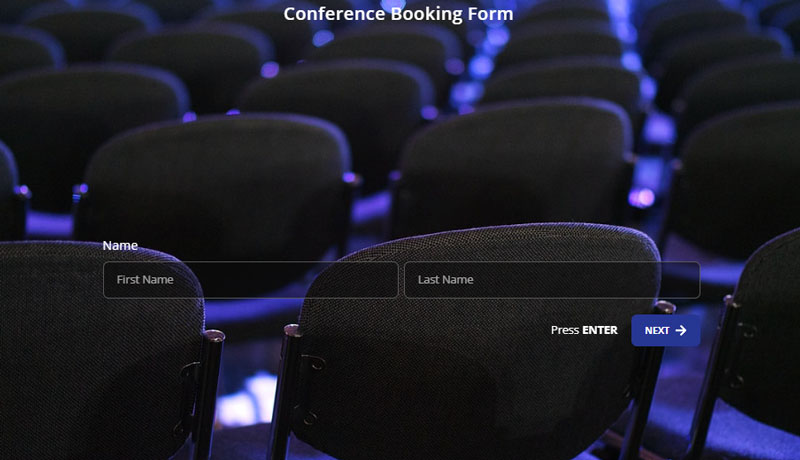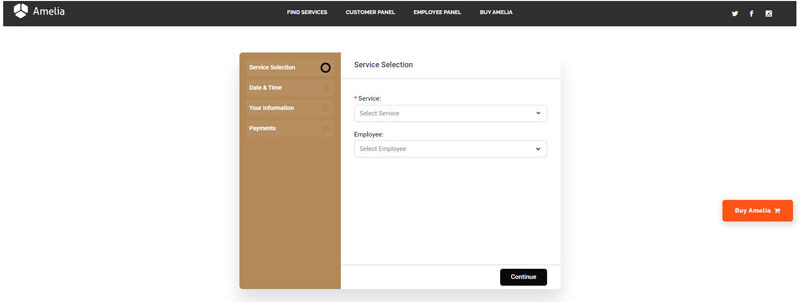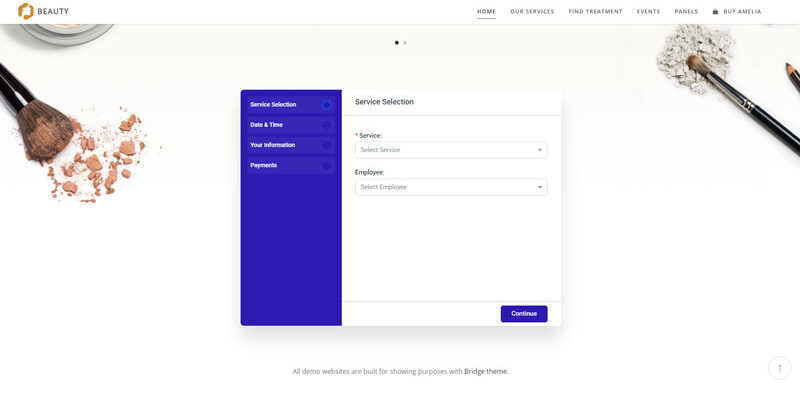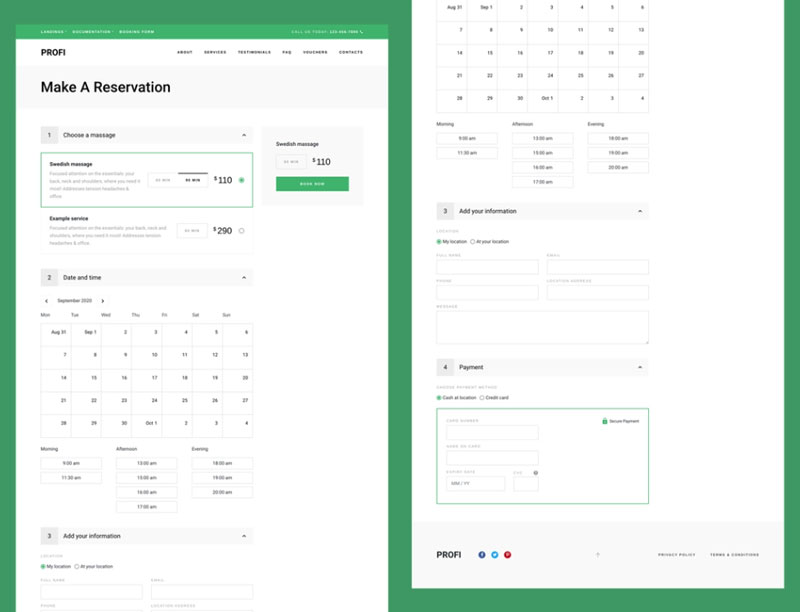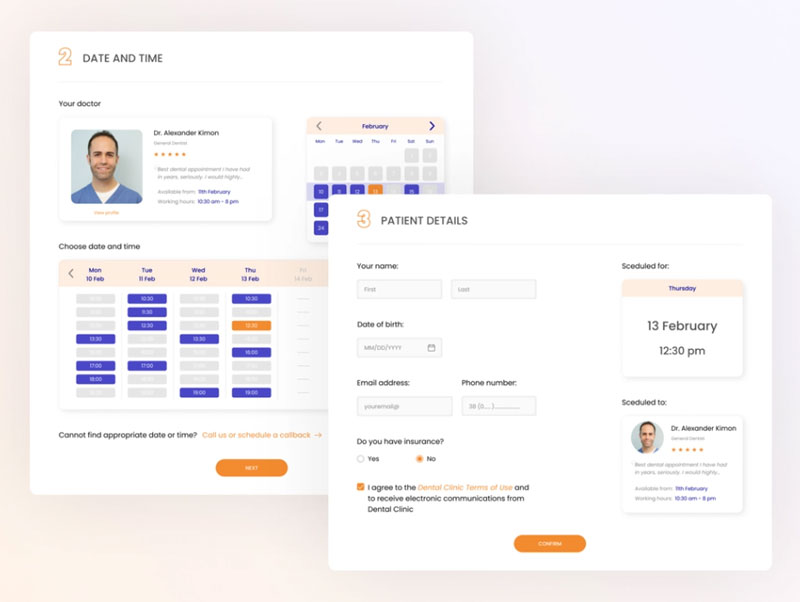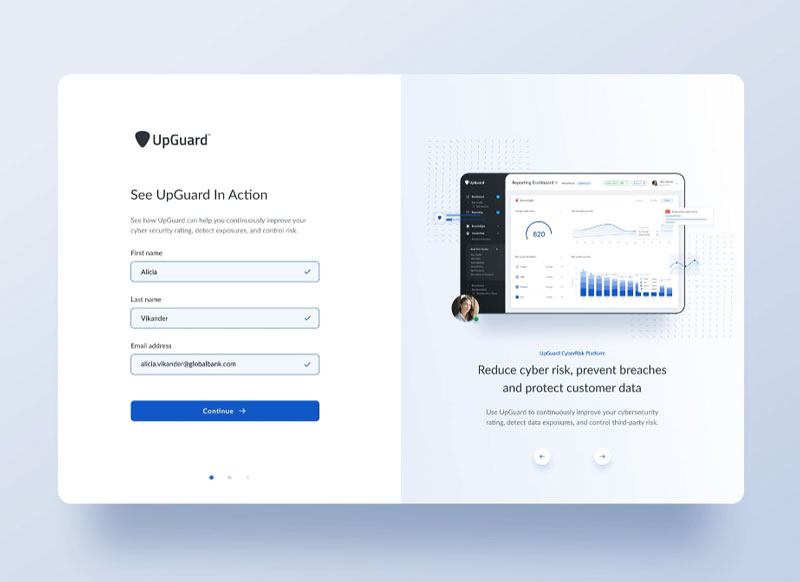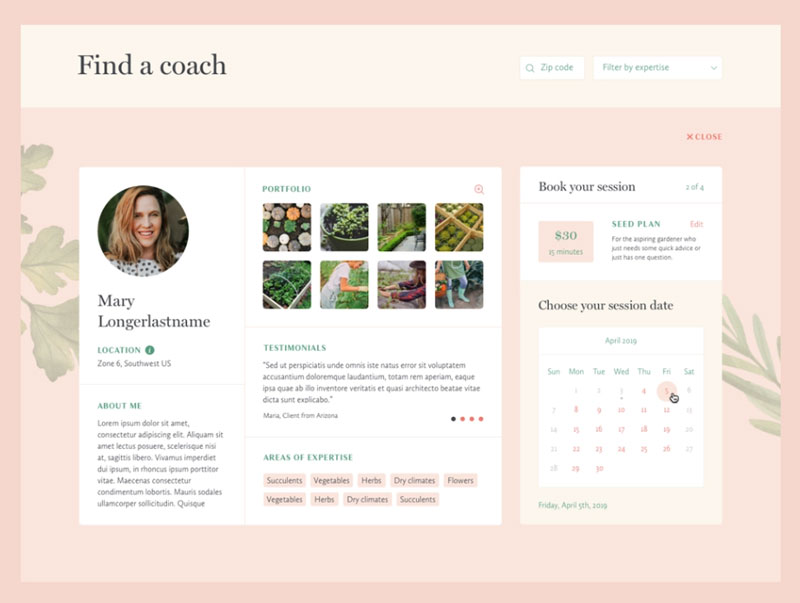Maximizing ticket sales for a conference or similar event is a demanding job. It requires a combination of several specialized tasks. You need to know about event marketing and sales, and you need to understand your target audience. As is often the case in sales, the initial sale of tickets is very successful and then stagnates all of a sudden. This can be very discouraging.
This guide is a help to professionals who want to boost ticket sales. The guide uses the best strategies from the industry as its basis. Enjoy the article while learning about marketing strategies for ticket sales.
How to Increase Your Event’s Ticket Sales
Tell an Engaging Story about Your Origins
Humans share many experiences in common. Our personal experiences may thus not be unique but they help us to relate to other people. If we can relate to others we can also learn from them. Use this to show others why you organized the event.
Emphasize the fact that you are like them and that you face similar problems. You want to share your experience so that they too can overcome those problems. The better people can relate to you, the more they will trust you and that will determine how many tickets you sell.
Sell Tickets at the Right Price Level
An important aspect of marketing strategies for ticket sales is finding the right price. On the one hand, nobody wants to pay for something they find too expensive. On the other hand, if your prices are too low, you won’t be able to cover your costs.
You must base your pricing strategy on your competitiveness. Do some research and find out what your competitors charge for similar events. Also, consider your position in the market. Are you new or have you established a name for yourself? Do your events contain unique features, like a celebrity or popular venue?
Offer Discounts and Different Types of Tickets
You could offer discounted tickets for early bookings or premium options. You could perk up meet-and-greets with celebrity guests. Make sure that you highlight these special features and inform people about any price increase as the date of the event approaches.
Another way to boost ticket sales is by offering group discounts. You can approach event sponsors and invite them and their companies to the event.
Convert Customer Loyalty into Revenue
The best customer is a loyal customer. Not only do they come back to you but they also speak positively about you to others. They engage with your brand and refer you to their colleagues and friends.
You need to take good care of these loyal customers. Bear in mind that 80% of your business comes from 20% of the total number of your customers. Thus, 80% of your ticket buyers come from that 20% of your customers. In other words, this 20% of loyal customers can make your event a success.
It is probable that you will have loyal attendees if you host events on a regular basis. These are the most valuable attendees and customers that you can imagine. You should work hard to keep them coming back.
Fear of Missing Out (FOMO)
You can do much to stimulate this fear of missing out. You can create a sense of urgency so that people feel that they have to get their tickets right now. The technical term for this is scarcity marketing. Researchers that have carried out a survey on this marketing strategy have shown that it works.
A word of warning: do not lie to your potential customers. Do not say that there are a few tickets left when this is not the case.
You can create that sense of urgency in different ways. You can, for example, add a countdown clock to the event ticket sales website or display web push notifications. The clock reminds visitors that the time to get a ticket is running out. As a variation of that, you can use the clock to encourage people to book in advance. Seeing that early-bird tickets are cheaper, people will be motivated to buy.
Up the Ante on Free or Low-Cost Options
A low barrier will bring more people to your event. Some event organizers hesitate to charge people for the complete event.
If you are hesitant to charge for your event you can think of a freemium pricing model. In that case, you would offer paid and free tickets to your event. People can sign up for free. That will ensure that many people will be eager to attend your event. These free tickets give access to everything that falls under the basic admission experience.
You can then sell premium tickets in addition to the free signup. Premium buyers get access to extra experiences besides the basic experience. Again, that means extra revenue for you.
Reach a Bigger Audience by Going Hybrid
People have become more familiar with virtual meetings as a result of the COVID-19 pandemic. You can take advantage of this development by offering both high-quality online and in-person meetings. By doing this, you will cater to the preferences of a much larger audience. Also, you can start thinking about going international.
If that is the direction you want to take, you will need a professional live-stream set to provide the best experience. Of course, you need to know how to get the best out of your equipment and affiliate marketing software. When you have managed to master all that, you will be ready to reach a global audience of new followers.
Sell more event tickets with the right tool for the job
Staying organized has never been easier.
You can now manage your business and grow your brand with a single, powerful WordPress booking plugin that keeps all of your appointments or event bookings in line, your clients organized and your business booming.
Amelia is a great events plugin for business owners who need to streamline their booking experience both for their staff and their clients.
Amelia handles everything for you, even sending automated email or SMS reminders to your clients. No-shows? Not anymore!
The Amelia WordPress booking plugin adapts to different industries for a blissful online booking experience and employee management.
Want to know more? Check out Amelia’s awesome features to see what you are missing.
Make a Unique Event Page
The previous items discussed how to optimize your marketing strategies for ticket sales. Now it is time to look at the event page.
Nowadays, the internet is the place where people learn about upcoming events. After visiting the page and obtaining more details, people decide whether they will attend. Make sure that your event page grabs the attention of the visitors.
The event page should answer the most important questions. Here are some things you should include:
- Where will it be?
- What is it all about?
- Who will be hosting it?
Avoid using vague descriptions. Those will not convince anyone. People want reasons why they should attend your event.
Sell Tickets from Your Own Event Website or Blog
If you want to sell tickets online you need to make sure that people can trust your sales process. The most reliable source will be your own website.
Through your personal website, you can advertise your brand and lay down your terms and conditions. You are not dependent on others to deal with refunds and you can come in direct contact with buyers that have questions.
If you do not have an event website you need to resort to a third party and they will have their own procedures and policies. Lots of details will be out of your control. Your clients may get nervous about buying from someone else.
Make a LinkedIn Group
Making an event group on LinkedIn can boost ticket sales for your upcoming event. Participants in a LinkedIn group can take part in discussions and set up collaborations.
With their help, you generate a conversation about your event in a natural way. Make the group public so that everyone can join. You may want to add attendees who have already registered and those who haven’t decided yet.
LinkedIn can generate a lot of social media exposure for your event. But through this social media platform, you will also get the attention of other professionals in your line of work. Add a direct link to your registration page so that people know where to buy tickets.
An added benefit of a LinkedIn social media group is that group participants can receive regular email updates. Now you are interacting with your clients in two ways: through your social media channels and through email.
Make Use of Facebook CTAs
Facebook calls to action (CTAs) are another tool in your event marketing plan. You can add a CTA to your Facebook page. Link your CTA to your registration page. Your fans and followers can then access tickets for their events easily.
You can make a special event page on Facebook. There is a special button on the administrator page for adding a call-to-action button. When you click on that button you will see a pop-up where you can customize your CTA. You can change the button’s text and the link to your ticketing page.
Advertise
Invest in event marketing and advertising. Direct advertising gives your event exposure to a wider audience. Sometimes you need to get as many people as possible to be aware of your event.
- LinkedIn, for example, offers many sponsorship opportunities. These links can get you into contact with many more potential clients and eventgoers.
- Search engine advertising is very effective but pricey
- Facebook also offers paid advertising, which is more affordable. Facebook lets you advertise photos, posts, videos, and much more. There are Messenger ads, campaigns for collecting interest, responses, and RSVPs. Other options are retargeting ads and ads that target a specific demographic. You can target gender, location, age, or interests.
Create an Email Newsletter
Email newsletters are a successful channel in your event marketing efforts. Their strength lies in the fact that your newsletters will reach people that have already shown interest. The success rate of email newsletters is thus much higher. The recipients are more likely to become potential ticket buyers after seeing your list of upcoming events.
An attractive option for sending email newsletters is that you can segment them to appeal to a specific target audience. You could make lists of subscribed CMOs and another one of startup owners. You can send them the same information but with wording that appeals to each group. Sending segmented email newsletters can help you to sell more event tickets.
Launch an Affiliate Campaign
Many consumers receive hundreds of advertisements, promotions, newsletters, and likewise each week. That makes word-of-mouth advertising something personal and refreshing.
You can use the power of word-of-mouth advertising by rewarding attendees for sharing links on their social media channels. In that way, you will be able to see how a new registrant finds out about your event. You can give a commission or discount to the attendee that shared the referral link.
Create Content Around the Event
Many marketing strategies for ticket sales rely on blogs and vlog posts. Creating content related to your event will promote it in an effective way. Posting content before the event will inform and educate your clients and reach a new audience. It creates momentum for the event, leading to an increase in event ticket sales.
When you engage in content marketing campaigns you need to keep in mind that you want to offer something of value. You don’t want to give the impression that you are only trying to sell event tickets. You need to pay attention to the interests of your audience. Include relevant information and other helpful tips for your readers or viewers.
Utilizing Speakers’ Online Networks
Your speakers and other performers have a network too. It is in their interest that many people attend your event. Your guest speakers will likely be willing to use their social media outlets to promote your event. Using their extensive networks will help to make your event a success.
How many attendees will be at your event is strongly linked to your talent lineup. The exposure that your event gives them, results in a relationship that is beneficial for both parties. You sell more tickets and they get the exposure they need to boost their careers.
Exploit a Customer Referral Program
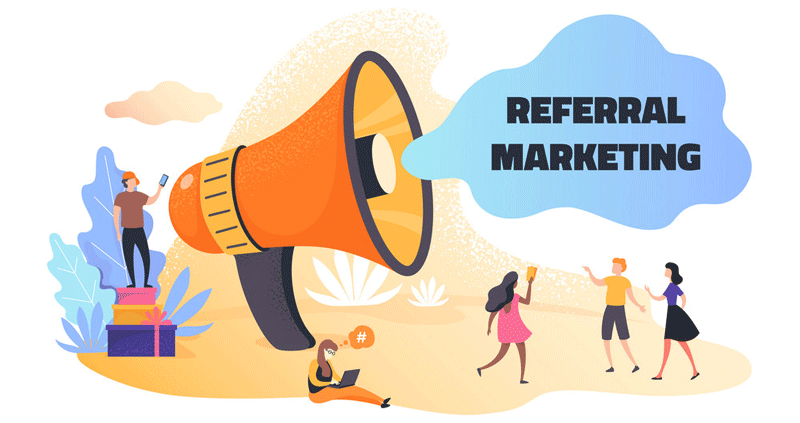
Referrals are very powerful marketing tools. When one e of the buyers talks about your event to others, this can. lead to these buying tickets too. . You could establish a reward system for the referrer. The power now lies in the fact that the referrer is referring to benefit themselves. They want to make a small profit for themselves without thinking about how this benefits you.
How can you do this? Think about how to incentivize ticket sales. Make a list of the rewards you are willing to offer. Your customers can consult the list and they will know and find out what is in it for them.
Create a Contest
First, think of what elements you want your contest to have. What would you like to achieve? You would definitely like to increase your revenue from ticket sales.
The whole point of this is also to increase awareness. A contest has the power of increasing publicity.
In addition, it will generate a lot of important data for you. You can ask the contestants to send you some kind of personal detail. This could be a picture, company name, or something else you can use. If you ask them to send it to you by email, you can generate a list of potential new customers. You can then target the list with your newsletter or event updates.
Encourage Performers to Be a Part of Your Promotion Efforts
Your performers’ and presenters’ needs are the same as yours. Your audience is their audience, so they also want you to sell as many tickets as possible.
Many speakers and presenters have a following of their own. Their fans are your potential meeting attendees. You can set some tickets aside that you can sell through your booked performers to sell to their fans.
Offer to help your guest speakers to promote your event through their website or social media platforms. Ask them to add your ticket widget to their pages. That gives their fans a direct link to the place where they can get tickets to see their heroes.
Enlist Event Sponsors in Promotional Efforts
Experience has shown that engaging event sponsors is very effective in event promotion. With the right partnerships, you get access to a new audience. Make marketing expectations a part of your partnership deals. Shared marketing efforts should be beneficial for both parties.
Here are some things that you can include in the deal:
- Providing a special discount for the sponsor’s employees and customers
- Setting an advertising budget in sponsorship fees
- Supplying a set of branded images, links, and other promotional material for partners to use
Embrace Retargeting
Retargeting works. Retargeting means that you send follow-up messages to people that have shown interest in the past. A retargeting message can turn a maybe into a yes.
You can use the retargeting approach on people who have added an event ticket to their basket but haven’t checked out. You can also think of people that have clicked on a Google event ad.
Promote Your Next Event During Your Current Event
The audience for your next event will come, to a large extent, from past attendees that enjoyed your previous events.
At the end of an event, you have the perfect audience for promoting your upcoming event, which means more advertising at no cost. They take an interest in you and your event, and only moments ago enjoyed a good time with you. This is the time to offer early-bird pricing discounts.
You achieve a feeling of urgency and exclusivity at the same time. As discussed, these are two important motivating factors for buying event tickets.
Focus on Your Most Successful Channels
The internet has opened up different channels for promoting events or conferences. These can be very effective but keep in mind that each channel requires focus. If you don’t have the required focus for a specific channel most of your efforts will go to waste.
It sounds like a good idea. Posting a little bit here, a little bit there, and adding some pictures on another platform. That will satisfy all users. But the reality is different because your efforts are too spread out.
Try to find out which of your channels works best for you and your audience. Then invest most time and effort into feeding that channel with information and promotion for your event.
You can keep track of which of the channels you used for past events generated the most hits on your ticket page. If this is your first time, it is best to focus on the channel where you have the most followers.
FAQs about marketing strategies for ticket sales
1. What are the most effective marketing channels to promote ticket sales?
Depending on your target audience and the sort of event, different marketing methods will be more or less successful in promoting ticket sales.
Email marketing can be useful for connecting with those who have previously expressed interest in your activities, while social media sites like Facebook, Instagram, and Twitter are ideal for reaching a wide audience.
Additionally, important outlets for encouraging ticket sales include paid advertising, search engine optimization (SEO), and event listing websites. Effective backlink management can further enhance the visibility of these outlets, driving more organic traffic and boosting overall engagement.
2. How can I create a sense of urgency to encourage people to buy tickets?
A good technique to get individuals to buy tickets is to make them feel as though they must do so immediately. Limited-time offers, special discounts and early-bird pricing can all evoke a sense of urgency.
It can also be helpful to use countdown timers and emphasize that tickets are selling quickly. To get consumers to act swiftly, it’s crucial to make sure that your messaging is clear and your incentives are alluring.
3. What is the best way to segment my audience to target the right people for my event?
You may more effectively target the correct attendees for your event by segmenting your audience. Based on demographics, hobbies, previous buying behavior, and other variables, you can divide your audience into several groups.
This can assist you in modifying your marketing messages so that they appeal to various demographics. It is simple to establish and target segmented groups thanks to tools like email marketing software and social media advertising platforms.
4. How can I leverage social media to increase ticket sales?
Using social media to encourage ticket sales can be very effective. Social media can be used to spread the word about your event, generate hype, and interact with your audience.
Think about working with influencers to advertise your event, utilizing hashtags to improve awareness, and running social media ads to target particular audiences. In order to grab people’s attention, be sure to provide eye-catching images and videos.
5. Should I offer discounts or early-bird pricing to boost ticket sales?
Using social media to encourage ticket sales can be very effective. Social media can be used to spread the word about your event, generate hype, and interact with your audience. Think about working with influencers to advertise your event, utilizing hashtags to improve awareness, and running social media ads to target particular audiences. In order to grab people’s attention, be sure to provide eye-catching images and videos.
6. How can I measure the success of my marketing strategies for ticket sales?
The effectiveness of your ticket sales marketing strategy may be evaluated in a number of different ways. Metrics like website traffic, click-through rates, conversion rates, and revenue from ticket sales can all be monitored.
You can also gather information about attendee satisfaction and experience using surveys and feedback forms. To improve your marketing approach, be sure to establish specific objectives and monitor your success frequently.
7. What role does email marketing play in promoting ticket sales?
Using email marketing to encourage ticket sales can be successful. Email can be used to communicate information about your event, emphasize early-bird discounts and other special offers, and deliver targeted communications to audiences who have been segmented.
Another excellent way to interact with participants before and after the event is through email marketing. Make sure your emails have strong calls to action and interesting subject lines.
8. How can I leverage influencers to promote my event and boost ticket sales?
Having a partnership with influencers can help you market your event and increase ticket sales. Find influencers who fit the bill for your event and have a sizable following in your industry or area.
You can provide them with complimentary tickets or other benefits in exchange for telling their audience about your event. To be sure you are getting a good return on your investment, track the success of your influencer partnerships.
9. What is the best way to communicate with potential attendees to drive ticket sales?
Getting in touch with prospective guests might be a crucial factor in boosting ticket sales. To reach potential attendees, think about utilizing a variety of channels, including email, social media, phone calls, and even direct mail.
The importance of personalization calls on you to adjust your messaging to the wants and needs of your intended audience. By including clear calls-to-action and links to your ticket sales website, you can draw attention to the advantages of attending your event and make it simple for visitors to buy tickets.
10. How can I use retargeting ads to bring people back to my ticket sales page?
Retargeting advertisements can be a potent strategy for getting visitors to return to your ticket sales page. People who have previously visited your website or ticket sales page will see ads when you use retargeting.
On social media sites and display ad networks, you can make retargeting advertising. Make sure your call-to-action is crystal clear and your ad design is captivating in order to persuade consumers to visit your ticket sales page again and finish their purchase.
Combine Your Marketing Strategies for Ticket Sales
You can boost your event ticket sales in many different ways. This post mentioned many of them. It is up to you to find out which strategies work best. It all depends on your event, your brand, and your audience.
Not every strategy works for any kind of event. You can try several tips and tricks for your next event and see how many tickets you sell.
Before implementing any suggestion, sit down and think about your goals and objectives. This is the most important thing if you haven’t used any of the suggestions yet. Research your target audience and decide on your marketing strategies for ticket sales. With time and effort, you will notice a noticeable increase in ticket sales.
If you enjoyed reading this article about marketing strategies for ticket sales, you should check out this one with event WordPress themes.
We also wrote about a few related subjects like setting up a WooCommerce events calendar, event planning tips, hybrid event ideas, and event management skills.
Not only that, but we also created articles about virtual event ideas, virtual event statistics, how to get sponsors for an event, tech conferences, and the most-watched sporting event.
If you want to know how to get sponsors for an event, you’ve come to the right place. There are plenty of people who need to draw potential sponsors for their corporate gatherings.
When you host corporate meetings and similar events, you’ll give your business the attention it needs. Besides boosting your brand, you’ll be widening your reach.
Hence, it’s not a surprise that so many brands are looking for corporate sponsorships to help them launch their events. Although this is a challenging task, it brings many benefits. But how do you get sponsors for an event? How do you contact potential sponsors? How do you provide them with a valuable proposal? How do you tackle the obstacles that may arise?
At this point, it becomes essential that you understand all the details about event sponsorship. If you want your future events to be a success, take a look at this guide. This information will certainly be useful for event organizers.
First Things First—Do You Need Event Sponsors?
Event sponsorship can be a great way to get new business partners. Large companies usually have a budget allocated for this purpose. Starting early is important. It is a good idea to give out free gifts, like food donations, goodie bags, and similar elements.
Creativity is a big plus when it comes to getting sponsorships, but remember that you must add value to your event so that it looks more appealing to potential sponsors.
The following set of questions might help you plan a strategy, especially for large projects or public events that may be significant to your corporation:
- Are you hosting a high-profile or large event? Will it feature reputable guests or speakers?
- What are you planning to achieve through this event? Are your goals impossible to achieve without an additional cash flow to your budget?
- Do you want to expand your brand awareness or increase your client database?
- Will you need help with any major aspect of your event, like transportation, catering, venue, or accommodation.
- Are you throwing an event that is one-of-a-kind? Are you looking to build credibility in your industry?
Event sponsorships are not only useful for raising funds. Any event planner knows that sponsors bring many other advantages, like powerful marketing. The following are some of the opportunities that your event sponsors might bring:
- Improvement of your brand’s image
- Increase in sales
- Building or enhancing brand awareness
In other words, a sponsorship agreement is a smart strategy for every business. Even if you don’t achieve all the benefits listed above, the results will be impressive.
How to Get Sponsors for an Event—Consider Different Types of Sponsorship Proposals
You can choose from different types of event sponsorships:
- Media sponsorship. When you have media sponsors on your side, you gain major publicity. Their job is to invest in media coverage, and this includes your event. Make it appear in newspapers, social media channels, and TV commercials.
- Financial sponsorship. If you need financial support, this is the right strategy. Your event sponsor will give you money in exchange for a place in your event. This can be a branded booth, a display of the sponsor’s logo, a message from the sponsor, or hosting products.
- In-kind sponsorship. In-kind sponsorship is about getting products or services. Thus, the event sponsors provide elements such as t-shirts, water, free samples, or even hotel rooms.
- Promotional sponsorship. With this strategy, you leverage the popularity of a particular persona. This can be a public person or a celebrity.
- Prize sponsorship. Provide badges, prizes, and other recognitions to your event attendees. This is a great way to engage your target audience.
Finding Sponsors—Which Companies Should I Contact?
Once you’ve decided which type of sponsor you need, it’s time you reach out to them. Where should you start? Event sponsorship is a delicate subject, and you must consider your reputation. A sponsor’s reputation can benefit or harm your event, and this is why you need to choose carefully.
A good place to start is by finding sponsors that understand the value of marketing in a sponsorship proposal. Once you find the right candidate, you’ll have to convince them that their investment will be worth every penny.
It’s also a good idea to find sponsors whose target audience matches yours. If you share the same demographics and interests, you can help each other. Although it’s impossible to find an exact match, choose the ones with whom you share key areas. Event planners must think about what areas of their projects they want to highlight. This will help them make the right decision.
You might also want to focus on the event ROI. Many sponsors want to see their names at a prestigious event. However, to get the most out of the partnership they must understand that cooperation works both ways.
So, if you’re still wondering how to get sponsors for an event, consider these tips to find the right ones.
How to Get Sponsors for an Event—Find Sponsors
Finding sponsors for an event may seem like a hassle. However, it’s not so complicated if you know where to look. Many companies are happy to take part in events that will put them right in front of their audience.
In this aspect, make use of your creativity. Also, there are some digital tools that you can use.
How to Get Sponsors for an Event with Digital Tools
In many cases, event organizers are looking for sponsors, and sponsors are looking for events where they can participate. Luckily, some virtual tools help these parties find each other.
LookingForSponsor

This is an ideal solution for every event organizer and content creator. LookingForSponsor offers a great solution that makes the searching processes easier. It includes a curated database of companies that want a sponsor.
Sponseasy
Sponseasy is a tool that will make your life easier. Its drag-and-drop interface will help you design your event sponsorship desk. You can also use any of its templates.
SponsorMyEvent

A powerful search engine. Popular brands like TEDx and Forbes use SponsorMyEvent. This is proof of its reliability.
SponsorPitch

Thanks to its filters and searching features, SponsorPitch helps you find the right fit. Connect with highly-qualified sponsors and dismiss the ones that aren’t a good match.
Write Great Emails and Engage Prospective Sponsors for an Event
Pay special attention to how you approach companies for an event sponsorship proposal. You mustn’t look needy or ask too much, especially during the first contact.
The best subject line is one that gives the right context as to why you are contacting this company. For example, if you’ve made contact before, and you made a favorable impression, bring it up. In other words, use what you have already achieved to attract potential event sponsors.
Thus, the subject line “We met at “X” event and would like to connect” is a great start. Without even knowing it, you’ll be providing context to your message and setting the ground for further communication.
Sell more event tickets with the right tool for the job
Staying organized has never been easier.
You can now manage your business and grow your brand with a single, powerful WordPress booking plugin that keeps all of your appointments or event bookings in line, your clients organized and your business booming.
Amelia is the perfect WordPress events plugin for business owners who need to streamline their booking experience both for their staff and their clients.
Amelia handles everything for you, even sending automated email or SMS reminders to your clients. No-shows? Not anymore!
The Amelia WordPress booking plugin adapts to different industries for a blissful online booking experience and employee management.
Want to know more? Check out Amelia’s awesome features to see what you are missing.
Be Specific about Your Event Goals
Even if you’re looking for financial sponsorship, you need to choose the right partner. Not just any sponsor will do. If you need to book a sought-after hotel venue, then don’t go looking for media sponsors.
On the other hand, if you have several goals, a combination of multiple sponsors might be the solution. Let’s illustrate this with an example. Hypothetically, you have to host an event for which you need solid PR and where the best speakers in the industry will participate. A good solution might be to get a promotional sponsor and get VIP hotel suites for your speakers.
Find Companies that Sponsored Similar Events
Create a list of potential sponsors for your event. Include those that participated in similar events. By researching the sponsors that have a history of collaborating with your type of projects you have a better shot of finding the right one.
Also, find out what previous organizers provided those sponsors, and include this in your plan. Keep in mind that these companies invested in event sponsorship packages before and are likely to do it again.
All of this can constitute a great strategy to pitch to your sponsors more easily.
Find Corporations that Have the Proper Resources
Remember to pitch to companies that are able to afford event sponsorships. Even if they are interested in partnering with you, they must have the resources to do it. You should be able to trust your sponsors and feel comfortable about the agreement as well.
Next, you’ll find some advice on how to choose the right sponsors. Remember that they must be interested, related, and capable.
- Find companies with sufficient budget
- It helps if the company has a marketing/advertising department
- Choose companies through referrals
Avoid wasting time, and go after the brands that will be interested in your type of event. Moreover, make sure they are solvent enough.
Keep Your Assets in Mind
Sponsors are looking for benefits in exchange for their collaboration. Generally, this goes hand-in-hand with their marketing strategies. After all, no one would spend thousands of dollars without expecting something in return.
So, ask yourself what you can offer them. Your proposal must help their marketing strategy. In other words, offer them more than a few extra clicks on their social media posts.
If your audience is similar when it comes to demographics, you can offer them psychographics and analytics reports. Thus, you’ll make excellent use of your data. Another way of providing value is by granting them a VIP membership. This might work well as a cross-promotion strategy.
All in all, offer them incentives that they can’t find in your competitors.
Know Your Strengths
The best way to get others to invest in your project is to know it very well. Make sure you understand what your event is about and outline a plan. Thus, your sponsorship proposal must include:
- Vision and event goals
- Who will be the event attendees
- What makes your event special over similar ones
You have to understand the key features that make your event one-of-a-kind, like keynote speakers, special guests, and presentations that might attract sponsors. The location is also important. Include factors that will attract more traffic to your event.
At this point, a simple bullet point is not enough. Do your research and include statistics. All in all, show them what they will gain by supporting you.
Use Your Event Organizer Network
Remember that you’re not the first person to look for event sponsorships. Others have done it before you. Your event network is a valuable tool that you must not overlook.
Don’t be afraid to reach out and consult with experts. As long as they’re not direct competitors, this is a great approach. Besides getting valuable advice, you might enhance your database of contacts.
Experience is an important part of the process, so don’t hesitate to ask for help. Build your know-how and learn from fellow organizers.
Offer Incentives
Make sure your sponsors know what they will get from their collaboration with you. Every relationship is based on give-and-take, and sponsoring is no exception.
Make your proposal more interesting with the following ideas:
- Offer a free booth at exhibitions and trade shows.
- Place the sponsor’s logo on promotional flyers and banners.
- Place a QR code (created using a QR code generator) that points to the sponsor’s website or a promotional link.
- Mention the sponsor’s brand in newsletters, social media posts, and blog entries.
- Provide discounts or free passes to customers that buy the sponsor’s product. An affiliate software will allow you to generate discount links and track sales over these.
The bottom line is that you have to be willing to give more than you take. With this approach, you show professionalism and reliability.
Target a Local Sponsor
Sometimes, you don’t have to look very far. In most cases, you’ll find that the best sponsors come from your local community. Local restaurants and other brands may already know you by reputation. Naturally, they will be interested in keeping the local market active. In other words, they are likely to be the best candidates.
If you want to get a local sponsor, follow these guidelines:
- Target companies with a large presence in your area.
- Organize your strategy to include your shared interests.
- Be clear about the benefits that you offer.
- Keep an open mind. While you may be looking for financial support, the counterpart may need an in-kind sponsorship. Don’t close yourself up because their proposal can open a new perspective for you.
- Once you secure the deal, make sure to build upon this relationship.
Use Data and Figures
If you promote your event as a vehicle for advertising and prospect finding, you have to support it with data. Surely your sponsors will be interested in your figures and reports.
Provide performance reports on previous events and estimate the number of attendees. Feel free to share the registration data because this will provide a solid background to your proposal.
Specific information will also be useful. Includes click-through and sit-through rates and every detail that you can extract from your report. Such a strategy works both for in-person and virtual events.
The Importance of Timing
Some companies do event sponsorships during a special season. Moreover, their event budget is based on the performance achieved in the previous year. The best time for a sponsorship agreement depends on several factors: the economy, the industry, and the company’s ROI.
Even if a company is willing to sponsor events all year round, they may have limited budgets during some months. Fall and summer, for instance, are great seasons for hosting events.
On the other hand, other parties may not be sponsoring during these seasons because they are saving for their own events. In these cases, they might be willing to support you during the winter, when their activities are reduced.
So, when you target a company, make sure you know its timing. Also, this can be a good indicator of when to schedule your future events.
Offer Different Sponsorship Packages
Make sure your proposal includes many options. There should be different tiers, providing detailed information about them. Potential event sponsors should know exactly how much they need to invest and what they will get in return.
For instance, if you need 20,000 dollars to throw the event, you can accept a smaller amount from your sponsor. Your event sponsorship packages must include detailed information for each option. Use the following examples as a model:
- 20,000 dollars. This package includes the sponsor’s logo on all your marketing items, a sponsor’s ad on your digital signature, and a promotion of the sponsor’s latest product during the event.
- 10,000 dollars. Offer only two of the above-mentioned benefits.
- 5,000 dollars. Offer only one of the benefits.
Naturally, if you choose this approach, you’ll need to find many sponsors to cover one event.
Reach the Right People
At the end of the day, there will only be a few sponsors that accept your proposal. Keep this in mind, and make sure to reach the right contacts.
Your target sponsor can have different titles, but there are a few that fit into almost every strategy. Looking for corporate sponsorship on LinkedIn is a great idea. Search for the following titles:
- Sales
- Brand
- Sponsorship
- Marketing
- Business development
- Product development
- Communication
It always helps if you add a few lines. Request that, in case you reach the wrong person, they provide you with the right contact within the company. You’ll find that most people are happy to respond.
Leveraging Partnerships from Previous Events and Getting New Sponsors
If you want to contact sponsors in the future, make sure you keep in touch after the event. A good option is to segment your email database. Use an email verification tool to ensure your emails hit the recipient’s inboxes rather than landing in their spam. Thus, you can write personalized messages to the company sponsor that promoted your latest event.
Let them know how much money you raised and how this helps your community. Use tags in your social media posts, and give credit to your sponsors. This is the best way to make your relationship visible thus creating new sponsorship opportunities.
This engagement must continue all year round. Keep inviting them to events, and ask them to follow you on your social media platforms. You’ll find that this is an effective way to create a sponsor pool and get new donors.
FAQs about getting sponsors for an event
1. What are the key steps to take when looking for sponsors for an event?
Identifying the target audience, creating a sponsorship package, researching potential sponsors, coming up with a sponsorship proposal, negotiating the conditions of the sponsorship, and creating a post-event follow-up plan are the essential stages to take when seeking for sponsors for an event. You may increase your chances of finding the ideal sponsors for your event by doing these actions.
2. How can I identify potential sponsors that align with the event’s theme and audience?
Search for businesses or brands that naturally relate to the theme of your event or the target demographic in order to find potential sponsors that would fit these criteria.
Look for businesses that stand to gain from supporting your event and that have a track record of supporting occasions similar to it. Make contact with businesses or brands you believe might be a good fit and offer them a compelling sponsorship.
3. What should be included in a sponsorship proposal to make it more attractive to potential sponsors?
Include information about the event, such as the time, place, target market, and theme, in your sponsorship proposal. The advantages of sponsorship, such as branding possibilities, visibility in the media, and other value-added advantages, should also be described.
Each prospective sponsor should receive a pitch that is unique to them, emphasizing the advantages of sponsorship for their company.
4. How do I determine the appropriate level of sponsorship and corresponding benefits for each sponsor?
Each sponsor’s marketing goals and spending limit will determine the proper level of sponsorship and associated rewards.
Outline the various sponsorship tiers and the benefits they offer first. Work with potential sponsors to ascertain which level best suits their requirements and how the rewards might be tailored to coincide with their goals.
5. How can I negotiate with sponsors effectively to ensure mutual benefits are achieved?
Focus on developing a rapport with sponsors and learning about their goals in order to bargain with them effectively. Be open to inventive solutions that are advantageous to both parties and honest about what you can provide. Think of providing participants with extra benefits in addition to standard branding possibilities, such as speaking engagements or special access. Try to reach a win-win agreement while negotiating in good faith.
6. What are some alternative ways to offer value to sponsors beyond traditional branding opportunities?
delivering speaking engagements, unique access to guests, holding VIP events, and delivering sponsored material or prizes are other ways to provide value to sponsors in addition to typical branding opportunities.
To extend the sponsorship’s reach beyond the event itself, you might look into social media activations like influencer partnerships or branded content.
7. How do I measure the return on investment for sponsors and report on the success of their sponsorship?
Monitor data including social media engagement, website traffic, lead generation, and sales to gauge the return on investment for sponsors.
Provide sponsors with regular updates and a post-event report that focuses on the impact of their contribution. To get input from attendees and sponsors and utilize it to better future events, think about doing a post-event survey.
8. What are some common mistakes to avoid when seeking sponsors for an event?
When looking for sponsors for an event, it’s common to make mistakes like not doing enough research on potential partners, writing generic sponsorship proposals, providing benefits that don’t fit the goals of the sponsor, and not following up with partners after the event.
Establish open communication channels throughout the sponsorship process and take the time to design unique bids for each sponsor to avoid making these errors.
9. How can social media be leveraged to attract potential sponsors and showcase past sponsorship success?
By promoting the reach and engagement of your event’s social media platforms, you may use social media to draw in potential sponsors.
Use social media to promote the event and its sponsors by showcasing previous sponsorship successes, sharing endorsements from grateful sponsors, and developing branded content. Using websites like Twitter or LinkedIn, you may interact with potential sponsors and respond to their queries immediately.
10. How do I ensure a positive ongoing relationship with sponsors beyond the event itself?
Follow up with sponsors following the event and offer a post-event report that highlights the success of their sponsorship in order to ensure a positive ongoing connection with them beyond the event itself.
Maintain communication with sponsors via social media and email newsletters and provide them with chances to take part in upcoming events.
As a method to establish a long-lasting relationship, think about holding a sponsor gratitude event or providing unique access to your audience. In order to enhance the sponsorship experience and guarantee a positive ongoing connection, regular contact with sponsors and ask for feedback.
Final Thoughts on How to Get Sponsors for an Event
Getting sponsors is a challenging task, but it brings great rewards. Also, the process can be more interesting than you expected. One of the key aspects is to create a valuable offer. If you are wondering how to get sponsors for an event, the golden rule is “provide value”.
Reach out to the right people, and do it with plenty of time ahead. Consider these guidelines, and get the support you need to host your events.
If you enjoyed reading this article about how to get sponsors for an event, you should check out this one with event WordPress themes.
We also wrote about a few related subjects like setting up a WooCommerce events calendar, event proposal template examples, event planning tips, marketing strategies for ticket sales maximization, hybrid event ideas, and event management skills.
Not only that, but we also created articles about virtual event ideas, event statistics, tech conferences, and the most-watched sporting event.
Effective employee scheduling is crucial for small businesses, as it can significantly impact overall productivity, profitability, and employee satisfaction. (more…)
The applications for online booking forms are vast and diverse. You can book hotel rooms and reserve tables at restaurants. You can purchase tickets for events or for traveling. You can even use an online form to book appointments.
An online form helps you to be scheduled and organized. They make it easier for you to get customer information. A good booking or check-out form is essential. When designed poorly, it can make the user experience unpleasant and negatively impact profit.
Below are various booking form template examples to help inspire you. Each example is organized to be efficient and easy to understand.
Booking Form Templates
When you are looking for a booking form, you want to pick one that will help you gather all the information you need.
Booking form templates offer designs that provide users with everything they need. Then, they can customize the form template to their unique needs.
Some powerful features in these templates allow you to accept payments and view booking requests. Others allow you to sync information from your website to Google Calendar or Google Sheets.
Here are a few examples of booking form templates.
Medical / Health
This mock website is a great place to start if you are looking for ideas. The interactive template shows you what your client will see when they visit your site.
You can see how your descriptions of services, procedures, and appointment bookings will look from the visitor’s perspective.
Cleaning Service Online Booking Scheduling
This template is super useful for cleaning companies. You can customize the sales script to your own prices and services and provide other relevant information.
Fitness Gym / Yoga
This is a pseudo website for a gym or yoga center. You can tour the classes offered, and schedule individual or group training.
You can also see how the homepage will look to a customer. They can check availability on the calendar, book appointments, or choose their trainer.
Booking Form
This is a great free booking form template for hotels and restaurants. It makes organizing reservations easy, and you can add a payment processor to accept payments in advance.
Plus, you can design your website to match your company’s image.
Free Online Appointment Form
An organized schedule is a major element of success. For business owners, business executives and secretaries, every day revolves around a tight schedule. This appointment form template helps you maximize your work day.
You can also create a mobile-friendly version of this page so clients can book appointments or meetings on the go.
Consulting
This is another mock website designed for business consultants or coaches.
You will see how your services will appear to clients as they browse their options. You also see how easy it is for a client to schedule an appointment.
Car Service Booking Form
This is a great booking form template for mechanics. Vehicle owners can schedule maintenance or repairs for their vehicle. They can provide details, such as the make, model, and year, along with a contact number. This saves time when the customer arrives for their appointment.
The free version of this template comes with all the features included.
Car Service Booking Form
This is another great option for mechanics. This booking form template gives clients the option to book an appointment for specific repairs or general maintenance.
It also helps mechanics organize their appointments and manage service requests in a timely manner.
Hospitality Booking Form Template
This is an appealing template for the hospitality industry that you can easily customize to your hotel, resort, or tourism center. It’s easy to use and supports translation into other languages.
This template contains all the basic elements a booking form template needs. Clients fill in necessary information such as contact details and other pertinent details about their party. A client can also submit their arrival date and check out date so you know the duration of their visit.
Cruise Booking Form
This free booking form template is a great option for cruise websites. It’s built so you can accept reservations and collect payments online.
You don’t need to know how to code to use this form template. It is easy to set up and use in just a few minutes.
Booking Cancellation Form
This booking form template makes it easy for clients to reschedule or cancel when they need to make a change to their appointment. And it is an efficient way to integrate a cancellation feature to your website.
Wedding Photography Booking Form
Photographers and event organizers will love this template. It makes the booking process simple. Clients can book photography sessions and see your prices for each session.
Health Booking Form Template
This appointment booking form is great for hospitals, clinics, and nursing homes. It is also great for other lines of work such as therapist offices, beauty salons, and spas.
The client can provide their personal details and indicate if anyone will accompany them. They will no doubt appreciate not having to wait in line, since you will have all the necessary information in advance.
Taxi Online Booking
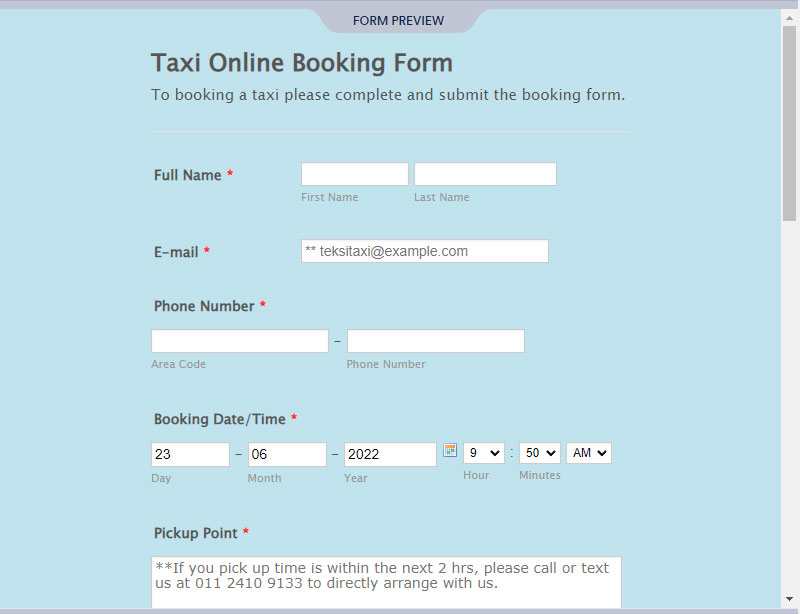
This template is perfect for taxi services. The customer provides contact details, indicates where they want to be picked up, where they want to go, and other preferences they have for the trip.
Learning Booking Form Template
This booking form template is ideal for academic institutions, or any organization that offers online classes or distance learning.
The customer fills in the relevant information. Then you review their application and send them what they need to get started. This form can also integrate email marketing so that you can keep clients up to date on available courses. Also, to enhance your email marketing campaign try enabling DMARC for your domains.
Conference Booking Form
This booking form template lets you handle all the details of organizing a conference in a smooth, organized manner. You can announce your conference and accept reservations in advance.
The online payments tool is built-in, so you don’t have to worry about how to collect payments.
Booking Form Inspiration
A well-made booking form is effective and makes filling out forms more enjoyable. When a booking form has problems or is hard to understand a client may quickly lose interest. When it’s well done, clients appreciate it.
Here are 10 booking form templates to get you started.
Barbershop
This is a dummy WordPress website for Barbershops. It supports online appointment forms. This booking form template supports the Amelia WordPress plugin and is easy to use.
Beauty and cosmetology
This mock cosmetology website is a great source of ideas for how your booking forms will look to the client.
You can look through lists of procedures and treatments offered. You can pick the employee you prefer and book an appointment.
Reservation Form
This form template has ideas for the look of your booking form. Clients can see prices for services, available dates, and add personal details. There is also a section for them to make online payments.
Form to book a dentist appointment
Here is another great source of ideas for your booking form. The layout is easy to understand and each step of the booking process is clearly marked and easy to follow.
Accounting Appointment
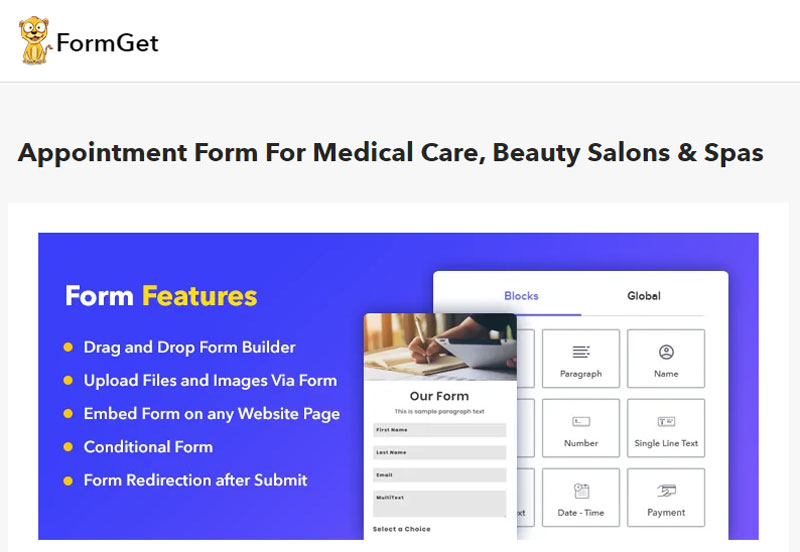
If you want inspiration, Accounting Appointment is a great option. The layout of the booking form is designed to put potential clients at ease. It is visually appealing and easy to understand.
Booking form for UpGuard
This modern, clean looking template is organized into slides showing each step of the booking process.
This booking form template helps you get the information you need without making things complicated for the customer.
Gardenary Coach Profile
This elegant demo has been arranged into slides so that you can see an idea of how the finished product will look.
How to Find an Online Booking System That Suits Your Business?
No two businesses are alike, so there is no “one size fits all” solution. How do you know which booking form template is right for you? Here is a checklist of things to think about before you decide.
First, write a list of the features you need.
If you have some ideas in mind, having a list of what you want is a good idea. You can check each option against your list and find which fits your business the best. This will help you make a more objective decision.
What if you don’t know what you want?
Here are some features you might find useful:
- A customizable appointment page that you can adapt to your brand and is available 24/7.
- Automated reminders that you can use to send announcements. (Be sure to check if it is included in the price or if it’s an add-on.)
- Adjustable appointment settings to schedule individual or group appointments. This will help avoid long wait times or lines.
- Advanced calendar settings. Between-booking buffer time slots are useful so you can enjoy a break or take care of other responsibilities.
- Intelligent reporting can help you to track your business’ performance and trace contacts.
- External calendar syncing and an integration library. This allows you to access other digital calendars or access video conferencing apps.
FAQ about booking form templates
1. What is a booking form template?
A pre-designed form that can be modified and integrated into a website or application to enable users to request and book services, events, or products is known as a booking form template. Booking forms can be used for a variety of things, including scheduling meetings, reserving tables at restaurants, and booking lodging.
2. How can I customize a booking form template to suit my needs?
The platform or tool used to develop the booking form template will determine how it can be altered. Most templates have a visual editor that lets users adjust the text, colors, and fonts. Additionally, some platforms let users integrate payment methods, change or remove fields, and customize confirmation messages.
3. Are there any free booking form templates available online?
Yes, you may download and alter a variety of free booking form templates from the internet for use either personally or professionally. Free templates are available on services like WordPress, Wix, and Google Forms that may be modified and integrated into websites.
4. What are the essential fields to include in a booking form template?
The aim of the booking form will determine which fields are necessary to include in the template. The customer’s name, contact information, service or product type, booking date and time, and any additional information or special requests are some of the most typical fields to provide.
5. Can I integrate my booking form template with my website?
The majority of booking form templates can be incorporated into websites or programs via plugins, code snippets, or embedding, so the answer is yes.
Booking form widgets are available on some platforms, including WordPress and Wix, and can be added to pages or articles.
6. Is it possible to add payment options to my booking form template?
Yes, payment gateways or third-party platforms like PayPal or Stripe can be used to add payment choices to a booking form design. Customers can pay for services or goods straight from the booking form by integrating payment choices into the form.
7. How can I ensure that my booking form template is user-friendly?
A booking form template should be simple to use, visually appealing, and intuitive in order to be considered user-friendly.
The fields should be succinctly and clearly labeled, and the form should be tailored for various devices and screen sizes. Users can also be helped by adding instructions or tooltips that explain what each field is for.
8. Can I receive email notifications when someone completes a booking form on my website?
Yes, the majority of booking form systems provide email notification tools that can be configured to alert the site administrator or owner when a booking form is completed.
The booking information that can be included in the email notice includes the customer’s name, contact information, and the kind of service or product they are looking for.
9. What is the best platform to use for creating a booking form template?
Personal preferences, financial constraints, and technical proficiency all play a role in determining the best platform to utilize when building a booking form template.
WordPress, Wix, and Google Forms are a few of the most well-known systems. Considering that each platform has a different set of features, pricing options, and connectors, it’s critical to pick one that best suits your requirements.
10. How can I ensure that my booking form template is secure and protects my customers’ personal information?
A booking form template must be hosted on a secure server, employ SSL encryption, and follow data protection laws like GDPR and CCPA in order to be secure and safeguard clients’ personal information.
Additionally, the booking process can be made more secure by employing a payment gateway or third-party platform for payment processing.
The Wrap Up: Inspiring Booking Form Template Examples
Scheduling appointments is a crucial element for many businesses. It’s worthwhile to invest in a good booking tool to help make this side of your business a success.
These are just a few booking form template examples out of the many wonderful options out there. Not all of them will be what you need. Your personal preferences, style, and brand will affect your final decision. Our goal was to bring you user-friendly options to inspire you and help you get started.
Hopefully, these options will be helpful to you.
If you enjoyed reading this article about booking form templates, you should read these as well:
- The Best Auto Repair WordPress Theme Examples for Your Shop
- Efficient Event Registration Landing Page Examples and Why They Work
- Something Better Than the Team Booking Plugin? 15 Examples
WordPress users have probably heard of Divi, one of the most popular themes out there. Many thousands of active users enjoy Divi’s drag-and-drop features, its wide array of pre-built pages, and its own Divi Builder. However, this WordPress theme lacks some important features.
If you have a business that requires booking, or you need to schedule appointments regularly, you’ll find Divi to be limited. But not everything is lost for Divi fans, because there are several plugins for WordPress that are fully compatible.
With a Divi booking plugin, you can find solutions for your business. For instance, you can access a solid platform to manage scheduling. This includes conditions, notifications, and other essential features.
Businesses operating around the clock or for extended time periods, like those in the service industry, experience a real scheduling challenge. (more…)
The digital revolution has forever changed conferences. What once was a week-long planning project can now be done the same day online. While some people may miss the old days, many benefits such as greater accessibility, brand awareness, and higher attendance make it clear that virtual industry events aren’t going anywhere.
They should be high quality, but how can companies get better at hosting successful virtual events? The first step to improving is learning virtual event best practices, and then finding ways to implement them.
In this article, we will explore how to host a virtual event that keeps guests engaged and interested.
Virtual Event Best Practices
Decide the Type of Event You’re Planning to Host
The most important choice you have to make is what type of event to host before you even start with the virtual event best practices. Are you planning a virtual career fair? A virtual trade expo? An online sporting event? Do you want to plan a more professional virtual conference? Or perhaps you would prefer a smaller-scale webinar?
No matter what type of business you run, there are many different styles of virtual events available. Deciding which to use depends on what you want to come from that event. You need to establish clear expectations, objectives, and timelines to be able to choose the right online event for you.
Perform Lead Generation Early
An online event is useless if no one attends. Lead generation is a necessary step to let people know about your first virtual event. There are multiple avenues for this, such as press releases, blogs, email marketing, social gatherings and using social media networks like Facebook or LinkedIn to gather leads and extract relevant databases. You might also explore the use of a LinkedIn data scraper to efficiently gather valuable data
Which you use depends on your target customer base and where you will have the most success. If you are a SaaS business planning to hold a virtual event but unsure which lead generation tactics to use, consider working with a SaaS lead gen agency.
Choose the Right Virtual Event Platforms for Your Virtual Event
Just like choosing a location, you need to choose the best place to reach your audience. In this case, this means choosing the best virtual event platform for you. There are lots of platforms, and you need to choose which works best for both you and your attendees.
Try researching features or pricing options to help choose which is best. You can also learn what other event organizers use, and ask why they use that platform.
Sell more event tickets with the right tool for the job
Staying organized has never been easier.
You can now manage your business and grow your brand with a single, powerful WordPress booking plugin that keeps all of your appointments or event bookings in line, your clients organized and your business booming.
Amelia is the perfect events plugin for business owners who need to streamline their booking experience both for their staff and their clients.
Amelia handles everything for you, even sending automated email or SMS reminders to your clients. No-shows? Not anymore!
The Amelia WordPress booking plugin adapts to different industries for a blissful online booking experience and employee management.
Want to know more? Check out Amelia’s awesome features to see what you are missing.
Bring Value, Not Pitches
This may seem superfluous; perhaps you’re thinking, “Well, if they buy my product, they will get value,” but your clients may not feel the same way.
This can especially be important if you told event attendees that there would be no strings attached to your event.
Instead of making pitches, try to deliver value by filling your sessions with interviews, master class series, expert speakers, and other content. You can leave your pitches to the digital marketing team and focus on providing valuable content.
Do not Skimp on Production Quality
Time is the most valuable resource that we can use, as it is the only resource we can’t get more of. Don’t expect people to trade their time for a mediocre experience. Audience participation and engagement tools can both help, but production quality is often the defining factor.
You need top-notch speakers as well as interesting topics to be able to stand out in the crowd. Your organizers need to engage and listen to the audience. You can listen by using plenty of polls or surveys. We are all learning, and we all want to create an overall better virtual event experience.
Record Sessions and Make Them Available After the Event
At a virtual event, everything can and should be recorded. If you don’t record your virtual events, then you are missing out on a great form of revenue. You can place your recorded sessions online for attendees who missed the event, or you can publish them on your demand generation strategies.
You can use these recorded sessions as leverage. Did you recently have a popular session? Use that session as a webinar after the virtual event to find a whole new set of prospective clients. You can even think about repurposing these events for infographics, blogs, or eBooks that can engage with clients on a whole different level.
Create a Human Experience in a Virtual World
The core of any event is “The Human Experience,” which just means keeping it real. Let the audience see a good conversation, no matter what the subject matter is. This increases attendee focus while staying sensitive to the global environment that your event attendees see every day.
The virtual environment can also come with some key features to help improve “keeping it real.”
As an example, online events can connect attendees using group chats. They can even collaborate in real time, which can further engage attendees.
Market Your Virtual Conference
People can’t come to an event that they don’t know about! Make sure to give yourself lots of time to promote your event.
A good general rule is to allow yourself three months of promotional time, giving monthly notices before the event. Then, as it gets closer, you can switch to weekly or daily notices for your social media audience. Social media can be a fast way to both promote your event and see how much buzz you’re creating as a result.
To get the most out of your social media campaigns, make sure to use a social media moderation tool to effectively monitor and manage content, ensure brand consistency, and maintain a positive online presence on different platforms.
All you need is to create quality content about your virtual conference and know when to post on LinkedIn and other platforms for maximum visibility and engagement.
Invest in Swag for Attendees
Corporate gifts, company swag, and other types of offerings can be a great way to engage attendees. Everyone likes getting free stuff, so try to get gifts that will go far with your target market. As an example, if you are talking to prospects, then swag gear may be the way to go. If you have a Millennial to Gen Z audience, get Pokémon Cards and watch their surprised joy.
You can even offer these gifts as prizes for those who engage in the event. A couple of example winners could be those who answer questions, provide feedback, join chat rooms, etc.
Technology Can Make or Break Your Virtual Conference
Technology is the wave of the future, and sometimes you have to ride it or be swept away. When looking for a tech platform, partner, or solution, don’t stop at one. Use more tech to make the best virtual event platform for your attendees, and give them the best virtual event experience possible.
Choosing the right platform and tech can be like cooking a meal. You can just buy a refrigerated meal from the store and give that to the company, but they may not be satisfied in the end. If, on the other hand, you buy multiple ingredients to cook the meal, your guests will have full stomachs when they go home. In the same way, there is no perfect one-stop-shop tech for running a virtual event.
Include Moderators at Your Event
Be ready for things to get out of control; people are often not as polite online as offline.
To be ready, make sure to have plenty of moderators on hand to mute or ban virtual event attendees in case of the worst.
Prepare Attendees for the Event
Don’t assume too much about your event guests; not everyone is tech-savvy. Make sure to prepare attendees to help them get the most out of your event.
Offer tech support for certain tool features, like vendors, rooms, virtual booths, and how to connect attendees.
Hire a Professional Emcee
One of the things that virtual events often miss is the opportunity to connect sessions, keynotes, and networking events all together without feeling disjointed. The solution? A professional emcee. When you hire someone to give announcements, lead Q&A sessions, and both start and end sessions, it will help infuse fun into the conference.
When looking for an emcee, it can be important to think about the tone you want for your event. Do you want serious or silly? Your emcee will be the face of the event, so choose someone that will represent your event best.
Use Virtual Features to Their Full Potential
Using the unique features that come with virtual events, plan to start engaging attendees tenfold. Think about the options you have available: tools to help attendee networking, live Q&As, one-on-one video calls, breakout sessions, as well as reaction buttons such as clapping or raising a hand.
All of these virtual features can help keep attendees involved in the event, which leads to better engagement. What’s more, you can even track the information to see what interests your audience and what they like best in your events.
Find Unique Ways to Engage Attendees
Give your virtual event attendees an interactive and engaging experience, and it will be a successful virtual event.
Whether you help people engage through social media (for example, through asking questions with specific hashtags) or by messages on your virtual event, be ready to respond quickly to keep people invested and excited.
Have a Plan or an Agenda Prepared
Making a virtual event without a solid plan in advance can be a setup for failure. Structure helps keep your guests engaged and keeps the meeting on time.
You can even share the agenda with attendees during event planning so they know what to expect. It also helps keep your speakers prepared for their time slot, therefore keeping the meeting smooth. Even if you post your event outline on Twitter by scheduling them with a schedule tweets feature, will give you a better engagement on your events.
Set a Realistic Timeline
Choose a time or date when people in your community can attend. Luckily, you don’t have to worry about the location as you do in-person events, but you do have an entirely different problem. Because your attendees can come from anywhere, you will need to consider time zones as well.
In an ideal world, planning to host a virtual event takes about eight-ten weeks, but don’t let that fool you.
Problems happen, and if you lose a week due to an issue during development, you may be stuck. Instead, try to book your event far in advance to let your marketing team time to work, as well as your event organizers to build it up to perfection.
Showcase Your Sponsors
Make sure your sponsors have a dedicated area to showcase themselves, just like an in-person event.
This can be done in several ways, such as displaying content, logos, or even a branded virtual waiting room. This can help develop the same impact as an in-person event, and at times will be even more interesting.
Track Engagement
You can take advantage of the benefits of online events after the effect in totally different ways than in-person events. As an example, for in-person events, it can often be difficult to tell when attendees are losing interest, especially after the physical event.
Using whatever tracking capabilities you have available to you (depending on which virtual event platform you’re using), you can tell exactly when attendees stopped participating, or when they started to leave.
You also can use social media to see when the buzz starts to die down. When do Tweets or messages start to slow down? What parts of the virtual event had the highest or lowest viewership? Which pages or pieces of content were selected the most? Using this information, you can start to improve for future events held online.
Gamify Your Event
You can help incentivize some parts of your virtual event by gamifying some of it. Both scavenger hunts and leaderboards help increase the time your audience participates and increase the lasting impression you will make on their minds. This can eventually prove to help the number of leads you get on mobile event apps or your website.
Send Out a Post-Event Follow-Up
You can follow up on events by sending a simple “Thank You,” or send recordings, additional content, readings, invitations to other networking events, etc.
You want to leave your attendees with a positive feeling about their experience.
FAQ about virtual event best practices
1. How can I ensure that my virtual event is engaging and interactive for attendees?
Consider adding interactive features like polls, Q&A sessions, breakout rooms, and gamification to make sure guests of your virtual event are engaged and interactive.
Additionally, give attendees the opportunity to participate actively by giving them clear instructions and a platform to express their ideas.
2. What are some effective ways to promote my virtual event and attract a larger audience?
Consider using social media platforms, email marketing campaigns, influencer marketing, and paid advertising to publicize your virtual event and draw in more attendees. Use your connections and partnerships to spread the news about the event and motivate people to tell their contacts about it.
3. How can I create a compelling agenda for my virtual event?
Consider the wants and needs of your target audience when creating a compelling agenda for your virtual event, and make sure it is in line with the main aims and objectives of the event.
To keep guests interested during the event, be sure to include a variety of speakers and subjects, and think about including interactive components.
4. What are the best practices for managing virtual event logistics, such as audio and video quality?
Consider running a test run prior to the event to make sure that all technological parts are in working condition in order to manage virtual event logistics successfully.
Additionally, provide guests with detailed directions on how to join the event, what supplies they’ll need, and how to resolve any potential technical difficulties.
5. How can I facilitate networking and relationship-building among attendees in a virtual event?
Consider including networking sessions, breakout spaces, and virtual lounges where attendees can mingle and converse informally to promote networking and relationship-building among attendees at virtual events.
Consider supplying resources and tools so that attendees can communicate with one another outside of the event as well.
6. What are some effective ways to measure the success of my virtual event?
Consider tracking metrics such as attendance, engagement, and participant feedback to evaluate the performance of your virtual event. Measure the event’s effect on your company’s goals and objectives as well, such as lead generation or brand awareness.
7. How can I create a sense of community among virtual event attendees?
Consider including opportunities for guests to connect with one another and participate in shared experiences to foster a sense of community among those attending a virtual event.
Additionally, think about giving participants tools and resources so they can keep in touch and talk after the event.
8. What are some ways to incorporate gamification into a virtual event to increase engagement?
Consider adding components like leaderboards, point systems, and challenges that motivate participants to actively participate and engage with the content to gamify a virtual event.
Consider rewarding participants who participate and engage the most with incentives or rewards as well.
9. How can I keep attendees engaged during breaks and downtime in a virtual event?
In a virtual event, think about offering entertainment to guests during breaks and downtime, such as music or films, or holding casual talks or virtual networking sessions.
Consider including wellness or mindfulness breaks as well to aid guests in recharging and refocusing.
10. What are some strategies for keeping virtual event attendees focused and productive throughout the event?
Consider breaking up larger sessions into small, more digestible segments and including interactive components like polls, quizzes, and Q&A sessions to keep virtual event attendees engaged and productive throughout the event.
Additionally, think about giving participants clear goals and takeaways for every session and using engagement tools to keep them focused.
Can You Implement These Virtual Event Best Practices Into Your Business?
Many people fear the idea of running virtual events, but hosting virtual events can prove to be a lifesaver for many companies.
Using the virtual event best practices, you have the building blocks of a great event. Just remember, always put yourself in your attendee’s shoes. Think about what they want to get out of your event, and then think about the needs of your sponsors, exhibitors, and organization.
If you enjoyed reading this article on virtual event best practices, you should check out this one with virtual event survey questions.
We also wrote about similar topics like adding a virtual events calendar to your site, how to add a calendar to WordPress, using an event WordPress theme, virtual events checklist, and the types of virtual events you can organize.
People who don’t arrive for their appointments can negatively affect any business. Whenever clients miss an appointment you not only lose money, but you also lose all of the other potential returning clients you could have gained. If you allow payments through your appointment scheduling application, you can guarantee payments and reduce no-shows, which increases your revenue. Having any payment service connected can help your revenue, but a PayPal booking system can help even more.
PayPal may not be the first company to make online payments a breeze, but it is certainly the first company that perfected it. It enables customers to pay online for free, allows multiple payment options, is easy to use, and is super secure. It is also global, as it allows over 200 regions/countries to make payments between one another.
This article will discuss the benefits of using a PayPal booking system.
Why Choose PayPal?
PayPal can be a great tool for any website that accepts payments. Not only is it trusted all over the world, but it also allows users to send money to anyone anywhere in the world. All you have to do is set up an account, and you can start sending money wherever you want. Most people have a PayPal account already, whether for work or for sending money to friends.
You can send or receive money from anyone who owns a PayPal account, but if you have a friend who doesn’t have PayPal it’s not a problem. All you have to do is show them the free account option, and they can integrate PayPal easily. PayPal also allows you to send money to friends or family at no charge. If you are sending money as a part of a business transaction, then there will be a small fee, but nothing unwarranted.
PayPal also grants businesses the ability to accept payments or send money to others online. They also have a credit and debit card that you can use with customers who don’t have PayPal. You can even send invoices to your clients to receive online payments securely.
PayPal also stores your credit and debit card information so that both you and your customers can increase the speed of online payments.
Having PayPal connected to your website can also give your website a sense of trust, not to mention the sense of convenience that it adds.
So, now that you know the strengths of using PayPal, you may wonder whether you need any other online appointment booking software to help incorporate PayPal into your appointments.
The Best PayPal Booking System
Using Amelia, you can connect PayPal to your appointment scheduling system for all of your clients. Using Amelia, you can be assured that your clients will pay for their appointments before you meet in person.
The PayPal payment gateway with Amelia accepts payments, and processes them online. The payment gateway enables you to accept money without going through too much trouble. Clients will also have the ability to pay with any other payment method they prefer.
It also provides a very user-friendly interface to ease the process of booking and paying for any of your services. It also helps you manage and accept payments without any customer interaction, if that’s what you prefer.
More on Amelia? Sure thing. Here’s why you need to pay attention to this booking system.
Amelia is a powerful WordPress booking plugin that works flawlessly with WordPress sites of all kinds. It has a minimal, yet powerful appointment booking interface designed to ease your workflow, automate repetitive tasks, avoid double booking, and make appointment booking a breeze for your customers.
You can even have email notifications and SMS notifications so that nobody forgets about their appointment bookings.
In order to book an appointment, the complete user interaction takes a few clicks with this WordPress plugin. Moreover, with it you can accept payments via PayPal and Stripe, perfect for those who want to pay in advance to book appointments.
As a business owner, you can monitor KPIs in the WordPress dashboard and analyze other important data to keep a pulse on your business. Amelia is a straightforward, no-nonsense booking calendar plugin and an amazing option for those who want an around-the-clock solution for their WordPress site.
Amelia also has an Events Calendar module integrated within its features.
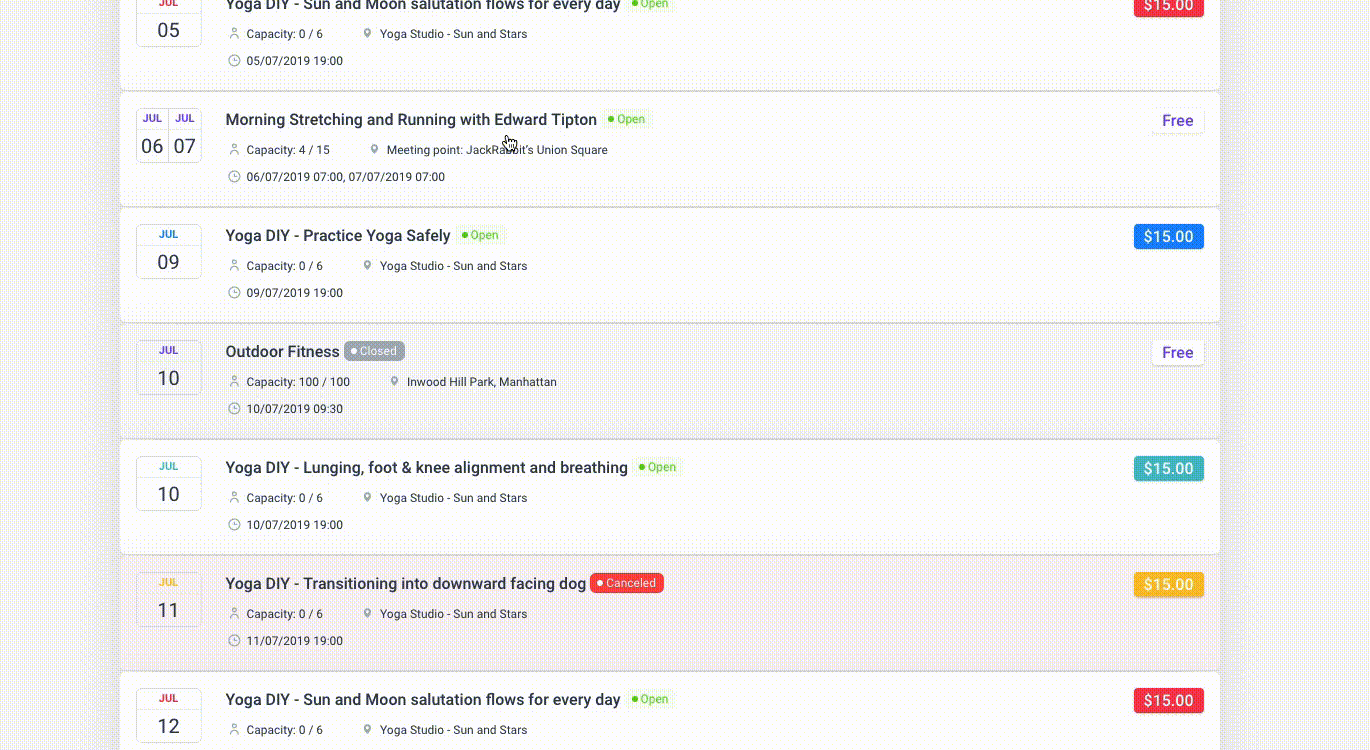
You can now automate your event bookings as well. To be more precise, it means that you will be able to schedule a single day, a multi-day, and also recurring events with Amelia.
Did we mention that you can manage multiple locations and that you have Google Calendar integration?
All of these and much more are under only one license, no add-ons are needed.
To test things for yourself, I’d suggest checking out the demos and seeing how things look on the front end as well as in the back end.
Medical/Health online booking page demo
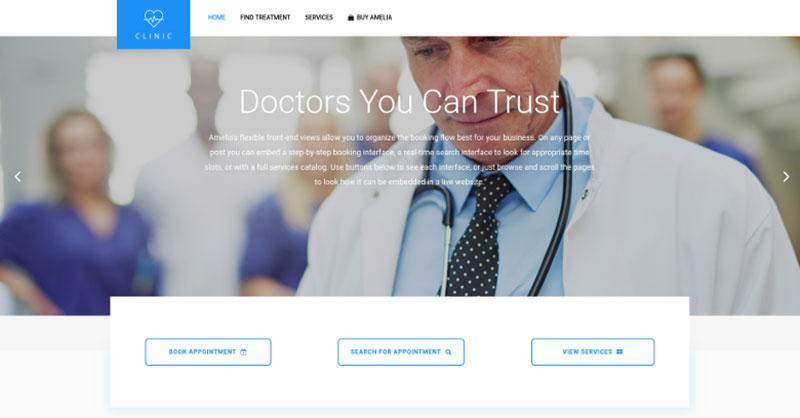
A website of a demo private clinic, where a visitor can read about provided medical procedures and services, and schedule an appointment.
Barbershop booking page demo
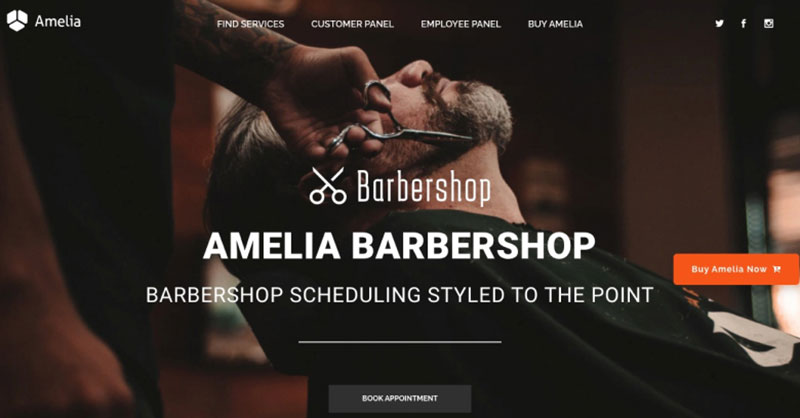
A dummy WordPress website for Barbershops with online booking – a nice and easy implementation with the Bridge theme and the Amelia WordPress booking plugin.
Fitness Gym / Yoga booking page demo
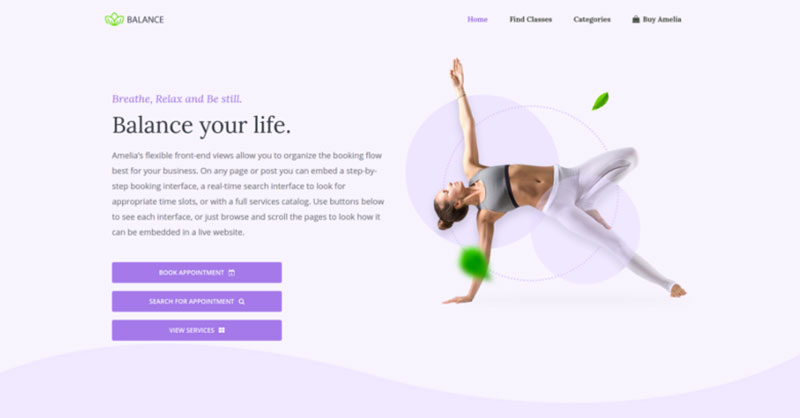
A pseudo Yoga/Gym online booking page where you can browse through possible Yoga classes, schedule individual or group training, and book a package of appointments.
Spa/salon booking page demo

A dummy cosmetology website – look through different cosmetic procedures and treatments, pick an employee and schedule appointments.
Consultant booking page demo
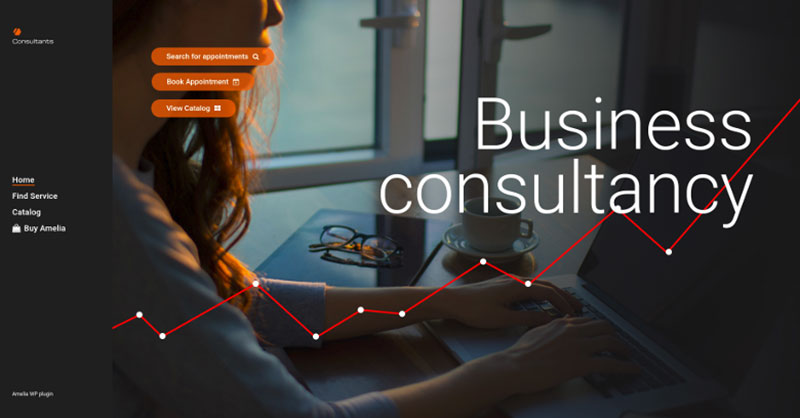
A pseudo Business Consultant / Coach / Lawyer website, where a customer can browse through provided consultancy and lawyer services and book an appointment.
Payment Settings in Amelia
Use the payment settings to decide the pricing format and payment gateways for your site. Whatever format you decide to use will be used for all of your prices, both on the front- and backend of the plugin.
This option is also what allows your customers to pay directly with their PayPal, whether it’s with their credit card, debit card, or their PayPal balance. First of all, you will need to activate the PayPal Service option. After that, you can select whether you want to use PayPal in Live Mode or Sandbox Mode.
If you choose to use the Live Mode, you will need to copy the Live Secret and the Live Client ID from your PayPal account in the PayPal app. After that, you can paste both of them into Amelia by going to Settings>Payments>PayPal.
If you want to test the environment of Paypal’s production area, use PayPal Sandbox Mode. Keep in mind that this function is designed for testing only, not for full business use.
To set up PayPal Sandbox Mode you need to follow these steps:
- Go to https://developer.paypal.com/developer/accountStatus/.
- Go to the left side of the page, and select Dashboard and then select My Apps & Credentials.
- In the REST API apps area create a new app or use an existing one.
- Copy the data from Client ID and Secret into the Sandbox Paypal Payment Settings, just like with Live Mode.
- Select the Sandbox menu and then Accounts.
- From this link use the developer account email and password to test the payment system.
Once you have PayPal enabled as a payment option, you will be able to see a new option entitled Set MetaData and Description. PayPal only allows you to set a description for the payment, so keep that in mind. You also have the option to set different appointment descriptions for whichever appointments or events you want to schedule.
This can help customers to know what they are signing up for while in the payment screen. And when you’re done, you can manage all of your booking and appointment scheduling needs easily. With this software, you can make and export monthly reports to keep track of how much it helped, but if you don’t want the reports, you don’t have to have them.
FAQ about PayPal booking systems
1. How do I book an appointment using PayPal?
Find a service provider who takes PayPal as a payment method before making an appointment. Choose the service you want to reserve after locating a provider, then head to the payment page. You will be required to confirm the payment by logging into your PayPal account.
2. Is PayPal a secure payment method for booking appointments?
Indeed, using PayPal to pay for visits is safe. To guarantee the security of your transaction, PayPal employs industry-standard encryption and has sophisticated fraud detection and protection systems in place.
3. What fees does PayPal charge for booking appointments?
For domestic payments, PayPal levies a transaction fee of 2.9% + $0.30 USD, and it is a little higher for international payments. The costs, however, can differ according on the nation and currency being used.
4. Can I cancel a booking made through PayPal?
The cancellation policy of the service provider will determine whether or not you can cancel a reservation booked using PayPal. If you need to cancel your appointment, check their terms and conditions to see if you are eligible for a refund.
5. How do I get a refund for a booking made through PayPal?
If you require a refund for a reservation that you made through PayPal, get in touch with the service provider first to see if they can help. If they are unable to assist, you can open a dispute in your PayPal account, and PayPal will look into the situation and attempt to assist in solving it.
6. Can I use PayPal to book appointments internationally?
Yes, you can make international appointment bookings using PayPal. However, keep in mind that there can be fees associated with overseas transactions and currency conversions.
7. What happens if the appointment provider doesn’t show up or cancels?
To determine if you may reschedule the appointment or receive a refund in the event that the appointment provider is late or cancels, get in touch with them first. You can open a dispute in your PayPal account and PayPal will look into it and try to fix the situation if they are unresponsive or refuse to assist you.
8. Does PayPal offer any protection for bookings made through their system?
Yes, PayPal provides safety for reservations made using their platform. PayPal’s Buyer Protection may be applicable, providing a full refund for the purchase if the service provider is unable to perform the promised service or if there are problems with the booking.
9. Can I book multiple appointments using PayPal in one transaction?
Yes, you can use PayPal to make several appointments in a single purchase. Simply place every appointment in your shopping cart and go to the payment page.
10. How do I view my booking history and receipts on PayPal?
Log into your PayPal account and select the “Activity” tab to check your booking history and receipts. All of your transactions, including any reservations made through PayPal, are listed here. For each transaction, you can also download and print a receipt if necessary.
Do You Need a PayPal Booking System?
If you are a business that relies on appointments, then a PayPal booking system can help your business. Appointment software can help businesses grow more stable revenue, and connecting a payment system to your appointments can make it even more stable. Stability is the foundation of a growing business, the more stability, the more growth.
If you enjoyed reading this article about using a PayPal booking system, you should read these as well:
- What Is an Online Booking System? (Reservation System Definition)
- How to Create a WordPress Booking System
- How to Create A Salon Booking System with WordPress
Hybrid events have a lot of advantages over in-person or virtual events. In many ways, they eliminate a lot of the complex logistics that come with hosting events. But it can be hard to come up with hybrid event ideas on your own. How can you plan hybrid events that will astound people?
This article contains some outstanding hybrid event ideas for the next event in your calendar. They can either help you get started with the planning process, or give you a few fresh ideas to make your event more dynamic.
Pre-Event Chat Groups
Even before the event starts, you can encourage attendees to make connections with others who are attending.
Pre-event chat groups can be a great place for guest speakers to present their topics and start discussions.
These groups don’t have to be complicated. You could set up a live stream session on the platform you will be using for the event. You can even set up a group on LinkedIn or Clubhouse.
Use Moderators to Energize Your Event
While it is important to hire qualified speakers, not everyone feels comfortable speaking in front of an audience.
If a speaker feels awkward presenting in public, the audience will pick up on it. People like to feel drawn in by a speaker. That’s why it’s a good idea to invite dynamic speakers to present at your event.
Hiring moderators can help with this. As they respond to the audience, engagement with the speaker improves and draws people into the program.
Use Technology to Connect the Two Audiences
As in-person events become more common again, it doesn’t mean that virtual events are going away. You could offer in-person attendees access to your hybrid event platform as well.
Usually, when a virtual event ends, the connection ends and people lose out on the association they could normally have at an in-person event. By creating a virtual event platform, on-site attendees and the virtual audience can still interact once the program is over.
Using social networking can also help keep people connected. Using hashtags or hosting a social media wall can expose guests to other attendees and encourage them to connect.
Invite International Speakers

Image source: TechCrunch
A significant advantage of hosting a hybrid event is that you eliminate travel difficulties. Guests can attend no matter where they are, and the risk of missing the event is all but eliminated.
In addition, you can invite speakers from anywhere in the world without having to pay expensive travel costs. Thanks to hybrid events, people can travel internationally without having to leave the house.
Multi-Channel Tracks
You can divide content into tracks depending on the audience’s needs and interests.
Then you can follow up with attendance data to see which events people were most interested in. This will help you develop better hybrid event ideas in the future that cater to those trends.
Incorporate Virtual Entertainment
There are a unique set of challenges to hosting hybrid events. For example, there are things that people enjoy about attending a physical event that virtual guests miss out on, like cocktail parties, dancing, and coffee breaks. So how do you come up with hybrid event ideas that meet that challenge?
Event organizers might choose to host entertainment directed at virtual audiences. For example, they might host a virtual cocktail party with a DJ on live stream. Guests can be afforded the option to communicate through the chat box while enjoying the event.
The event organizers can then encourage all attendees to post about the event on social media. This makes both in-person attendees and virtual attendees feel like they are part of the same community.
Vary Content for Maximum Engagement
To host successful hybrid events, providing top-quality content must be a priority. Trying to mix online and in-person audiences can distract organizers from the quality of their content. However, the content you provide is what will make the event memorable.
A virtual audience has a shorter attention span than physical attendees. There are more distractions for virtual attendees, so include breaks and opportunities to interact with the program.
The key to hosting outstanding hybrid events is to make the experience enjoyable for all attendees. When you show remote audiences that you care about their experience as well, it can make all the difference.
Physical and Virtual Breakout Rooms with Screens and Webcams
It is easy to create networking opportunities for separate gatherings in person and online. But to mix them well is challenging. If done right though, it can be a wonderful equalizer.
Why not try dividing your on-site attendees into small groups? You can do the same for virtual attendees by dividing them into breakout rooms. For each group at the in-person gathering, include a way for them to connect with a group from the online audience.
Consider A Group Chat for All Attendees
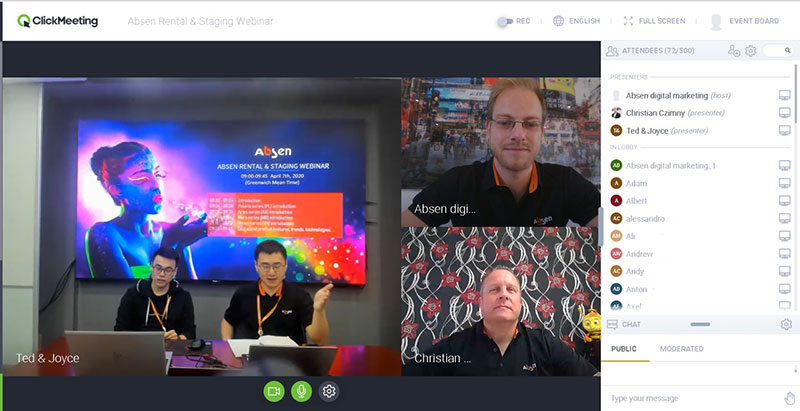
During virtual events, most audiences are used to using group chats to communicate with other attendees.
As you are coming up with hybrid event ideas, why not consider creating a group chat for those who will attend?
Blending both online attendees and in-person guests through a group chat is a great way to make sure everyone enjoys the event. If the guests can access the chat on their smartphone, no one will be tied to their laptop and everyone can join in the discussion.
Creating a hybrid event platform is another great option to blend in-person and online attendees. Each user can create a profile that will make it easier for them to connect with others who are in the same field or who have interests in common with them.
Call to Action
Another great way to encourage attendee engagement is to invite each person to participate.
By asking questions or getting input from the audience, they become part of the program and not just passive listeners. Even virtual attendees can participate by using the “raise your hand” feature on certain platforms.
Lean into Gamification
Providing a little friendly competition is a great way to bind a group together. As groups meet goals and face challenges together, it helps break the ice and draw people together. After the event concludes, people are more at ease to network.
A game or activity that ties back into the theme of the event is a great way to help audiences feel engaged. It’s easy to come up with separate ideas for the on-site attendees and virtual audiences. It is important to create activities for both audiences so that neither feels left out. With a little creativity, you might be able to come up with some ideas for games or activities that mix the two audiences. Or, you might pit the two separate gatherings against each other.
Get more bookings with the right tool for the job
Staying organized has never been easier.
You can now manage your business and grow your brand with a single, powerful WordPress booking plugin that keeps all of your appointments in line, your clients organized and your business booming.
Amelia is a great events plugin for business owners who need to streamline their booking experience both for their staff and their clients.
Amelia handles everything for you, even sending automated email or SMS reminders to your clients. No-shows? Not anymore!
The Amelia WordPress booking plugin adapts to different industries for a blissful online booking experience and employee management.
Want to know more? Check out Amelia’s awesome features to see what you are missing.
Skill-Building Workshop
A workshop is a great way to help attendees build new skills. Taking on a new skill or project in a group is a great way to encourage a sense of community.
It also makes trying new things more fun. Depending on your audience and their interests, you may choose to do a workshop on a practical skill, like computer skills.
Or you may go another route and choose a different skill to develop, like photography.
Create a Structured and Well-Balanced Schedule
One tricky part of the planning process for a successful hybrid event is getting both audiences to mingle. It may be a good idea to make time in the schedule for in-person attendees to connect with the virtual attendees. By incorporating virtual meetings into the schedule, attendees can engage in activities with each other and network freely.
Speaking of networking, why not add some time in the schedule specifically dedicated to virtual networking? If you set an hour or two aside for this purpose, you will see an increase in calls and meetings between guests and exhibitors.
When virtual attendees connect during this time, try including a redirect button to encourage them to go and network. Set up reminders for engagement competitions coming up. You could also include tips on how to meet and engage with people virtually.
Send Goodies to Your Remote Participants
When you are coming up with hybrid event ideas, it’s important to find ways to make virtual guests feel as valued as those who attend the actual event.
If you include goodie bags for the in-person gathering, make sure to get the addresses of your online audience and send them something as well. Make sure to do this well in advance, so that the virtual audiences don’t feel like an afterthought.
Leverage Recorded Content
Once the event concludes, the event doesn’t have to end there. If you have recorded versions of the workshops and the keynote address, why not immediately leverage those recordings?
This is a great way to maximize the results of your successful hybrid event and will serve you well when planning for future events.
Customizable Exhibitor Packages with Levels of Access
Each exhibitor will have different needs. You can address their specific needs by selling different package levels which offer different levels of access. Different packages might include year-round subscriptions or email communications. You can even give them the option of upgrading halfway through an event or during the year to which they are subscribed.
For example, a premium package might include things like Q and A sessions, meeting slots, contact details, live stream demos, and so on.
Hybrid Events Have Reduced Carbon Footprints – Use That to Create Brand Loyalty
Air travel contributes a lot to climate change and pollution. By creating hybrid events, you can cut down on the aspects of an event that harm the planet. Food and beverages, paper and plastic waste, and even booth structures all contribute to polluting the planet. When you host hybrid events, you help save the environment in the process.
Launch A Survey After Each Session
After each event, why not launch a survey to see how well you engaged the attention of your audience? This will give you insight into which activities or speeches were most effective. On-site attendees can also vote on this via the event app. This will help you come up with more effective hybrid event ideas for the next time.
FAQs about hybrid event ideas
1. What is a hybrid event and how does it work?
An event that incorporates both physical and virtual components is called a hybrid event. Some guests will often congregate in a real location, while others will take part digitally via an online platform. A bigger audience may be reached and participants who may not be able to attend in person can have flexibility with hybrid events.
2. How can I ensure a seamless experience for both virtual and in-person attendees?
It’s essential to have a clear plan and communication strategy in place to guarantee a seamless experience for participants who will be present in person and virtually.
To prevent any technical issues, make sure to test all the technology and equipment before the event. Encourage participation from all participants, whether they are in person or virtually, and give them clear directions on how to take part in the event.
3. What are some unique ways to incorporate technology into a hybrid event?
Technology can be included in a hybrid event in a variety of ways. Live streaming, virtual breakout rooms, polling of the audience, interactive virtual displays, and virtual networking opportunities are a few examples. Take into account what will be most effective for both your audience and the event you are hosting.
4. How can I make sure that the content of my hybrid event is engaging for both virtual and in-person attendees?
Consider using interactive components like live Q&A sessions, surveys, and virtual networking opportunities to ensure that the content of your hybrid event is interesting to both virtual and physical participants.
Additionally, give both audiences access to the content, with clear audio and pictures, and give attendees the opportunity to participate in the debate.
5. What are some best practices for hybrid event planning and execution?
Having a clear plan and communication strategy in place, testing all technology and equipment before the event, providing clear participation instructions, encouraging engagement from all attendees, and having a backup plan in case of technical difficulties are some best practices for hybrid event planning and execution.
6. How can I effectively market my hybrid event to both virtual and in-person audiences?
It’s crucial to target both online and offline audiences with the messaging while promoting a hybrid event. To reach both demographics, think about utilizing targeted advertising, social media, and email marketing. Point out the advantages of attending life or virtually, and give detailed information on how to take part.
7. How can I manage the logistics of both virtual and in-person components of a hybrid event?
A thorough plan that considers both virtual and in-person components must be in place in order to manage the logistics of a hybrid event.
Team members should be given roles and tasks, and a backup plan should be ready in case of technological difficulties. To prevent any last-minute problems, make sure to test all the technology and equipment before the event.
8. What are some effective ways to measure the success of a hybrid event?
Tracking attendance figures, engagement data, guest feedback, and money made are some useful ways to gauge the success of a hybrid event. To get input from participants and use it to better future events, think about employing surveys or polls.
9. How do I determine the appropriate balance of virtual and in-person attendance for my hybrid event?
For a hybrid event, the type of event and the audience will determine the proper ratio of virtual and in-person participation. When choosing the number of attendees, take into account elements like cost, accessibility, and the event’s goal.
To encourage as much involvement as possible, alternatives for both live and virtual attendance should be made available.
10. What are some potential challenges of hosting a hybrid event, and how can I mitigate them?
Hosting a hybrid event could present several difficulties, such as technological concerns, communication problems, and engagement problems.
Make sure to have a clear plan in place, test all technology and equipment, and give participants clear instructions in order to reduce these difficulties.
Team members should be given roles and tasks, and a backup plan should be ready in case of technological difficulties. Encourage participation from participants, both in person and virtually, and provide them with chances to get involved in the debate.
Additionally, think about offering attendees who might not be as familiar with the event’s technology assistance or training. You may guarantee a prosperous hybrid event that satisfies the needs of all guests by being proactive and taking measures to mitigate any issues.
Conclusion on Hybrid Event Ideas
The events industry is not going anywhere. Rather, events are likely going to be more and more valuable in the future. Events help people form connections and give them a sense of belonging.
Virtual and hybrid events have pushed event organizers to explore new worlds. Brainstorming virtual and hybrid event ideas has led them to discover new ways to connect with audiences.
Hopefully, the hybrid event ideas in this article will help you in planning your next event.
If you enjoyed reading this article about hybrid event ideas, you should check out this one with event statistics.
We also wrote about a few related subjects like setting up a WooCommerce events calendar, event planning tips, marketing strategies for ticket sales maximization, event proposal template examples, and event management skills.
Not only that, but we also created articles about virtual event ideas, virtual event statistics, how to get sponsors for an event, tech conferences, and the most-watched sporting event.


